#but. you know. if her audience isn't forming their own opinions about a series and just parroting back her own to validate her being wrong.
Explore tagged Tumblr posts
Note
Did you ever get my ask? I asked about what to do when a child loves something by a problematic author. How do you go about telling them if they’re too young? SHOULD you tell them? I’m talking about current 10 year old HP fans and children who like the Coraline movie. What do we do when it’s them and not adults? We forget about the target audience too much when we talk about things like this as if it were exclusively childhood nostalgia of Millenials/Gen Z
For fuck's sake, I didn't want to rise to the bait here, but this is making me mad because it's such a straw argument, so fuck it, I'm taking the bait. For context, this is anon's first ask:

Anon, first off, you are responding to a post that is five years old and about a subject that we pointedly do not post about anymore, and that alone makes me think you're not responding in good faith, but whatever.
Look, I work in a fucking library. We have HP books. If a child comes up to me and asks 'hey where's the HP books' I am not going to a) kick them in the face, b) tell them they're an idiot or c) refuse to answer. I am going to tell them where the fucking HP books are. I don't put them on displays I make, but I don't censor them, because we are legally not allowed to censor books in the library.
But I guess you're asking more if this is a kid who's in my life, as opposed to a kid who I just kinda come across. So, okay, I have a 9 year old neighbour whose family are friends with mine, we play video games together occasionally when her mum and dad need someone to watch her. And this kid reads books! And this kid reads fantasy books.
If I was seriously talking to her about the HP books, I might tell her about JKR! I would say something like 'I used to like the HP books, but then I learned that the author said some really nasty things about trans people like me. Now I don't like them so much any more.' And we could have a conversation about that, you know! I've talked to this kid about transphobia in terms that are appropriate for her age. We've had discussions about gender before. I think she'd listen to me, and form her own fucking opinion about it! 'I don't like the author of the HP books because she has said some nasty things' is a concept you can communicate to a five year old.
But also like. You're kind of acting like by taking away HP from this (hypothetical in your ask) kid they don't have any other books. Which...isn't true? If all copies of the HP books disappeared off the face of the earth tomorrow, kids would be reading other stuff, as they are currently reading other stuff! My 9 year old neighbour is a huge Jacqueline Wilson fan, she loves the Daisy Meadows rainbow fairy books. I want to introduce her to the Morrigan Crow books. We could get retro and start introducing kids to the Edge Chronicles, I fucking loved those books. Artemis Fowl. A Series of Unfortunate Events. There are so many other book series for kids in this world. I work in a fucking library! I can tell you that the kids are into Tom Gates, Dogman, Diary of a Wimpy Kid, Percy Jackson, Babysitter Club, Dork Diaries, and (exasperated sigh) David Walliams books, based on a sample size of every kid I encounter at work. I get asked for all of them far more than I do for HP, actually.
I don't think you'd be ruining every kid's lives by taking away One Series from them. (Particularly not one that's losing some relevancy every day - and I mean that in the sense that it's not an ongoing series, the last book came out in 2007. Nearly 20 years ago. For a nine or ten year old, that's almost double their entire life.) And I don't think you necessarily would be taking it away from them to say 'hey this is the reason I don't like these books'. I trust your average ten year old to be able to have a reasonably mature conversation. You're making it sound like they're all Oliver Twist holding out their gruel bowl saying 'please sir I only read one book'.
Anyway. All this to say, I think kids have the ability to have conversations about media. And there are other books in the world. So, no, taking HP or Coraline or whatever away from kids is hardly snatching candy from a baby. Kids are smarter than you think.
38 notes
·
View notes
Text
God . . . imagine thinking Laios is a bad person who doesn't care about people. actual insanity.
#yea this is about you know who's 'review' again. it's on my mind now that i'm trying to finish the series. sowwy. ;9#making this unrebloggable from the getgo this time so that drama obsessed freaks can't get their hands on my ramblings again. fuck off lmao#anyways imagine thinking that. IMAGINE THINKING THAT HE DOESN'T CARE ABOUT HIS SISTER. GET WELL SOON OR FUCKING PERISH.#EDIT HEY I'M NOT QUITE DONE ACTUALLY:#i heard someone else say this and now that i finished the series i honestly gotta agree on some level#i think this specific YTer did genuinely try to give the series as a whole another shot (since she was only watching the anime at first)#but then when she went into the manga was so fucking mad at her viewers and fans straight up disagreeing with her personal interpretations#(which were wrong but she took them down the dumb as fuck and extremely wrong road of All of These Are Factual Actually Sorry)#that she only really skimmed the manga (or looked at footnotes/summaries) and took up a soapbox of I Know Everything About This Thing Now#and doubled down on her just completely wrong and honestly dumb opinions and interpretations being presented as fact out of pure spite#it legit sucks so fucking bad. cause like i know and have actually seen her audience who haven't ever touched the series#(or some that maybe started it and have some sort of beef with it for one reason or another and had those feelings validated by her)#parrot back these ideas as if they're true! i partly know it cause it happened with me and her talking about fucking ****** ********!#like legit i sometimes check like her channel or her blog on here every so often and i saw a post of hers on here#where someone in the replies just. blindly agreed with her! and called Laios a bad person probably without ever checking DM out themselves!#which is crazy cause this YTer used to call out like other YTers not taking hard stances#feeling they have to cloak whatever opinions or stances they have in a million This Is Just My Opinion disclaimers etc#which made me realize Oh Hey Yea They Do That like i used to like that about her!#but. you know. if her audience isn't forming their own opinions about a series and just parroting back her own to validate her being wrong.#then it's fine. i guess. epic echo chamber moments or what the fuck ever.#okay NOW i'm done i think. this time. i like to bitch and moan so i might vague post about her again probably. tee hee. :3
3 notes
·
View notes
Text
"Why The Last Jedi Isn't Just Bad - It's Toxic" by M. Krasava
DISCLAIMER: This editorial was originally published on Scavenger's Holocron, a sadly-now-defunct Star Wars news site. I feel like it's a tragedy to have it deleted from the Internet and only accessible to dedicated parties who know about it via the Wayback Machine, so I'm reposting it here as a form of greater preservation/availability.
Currently being regarded as the most controversial Star Wars film to date, fans of the popular franchise seem to have settled into two groups: this is either the best Star Wars film ever made, or the worst. Cinematically speaking, the movie has stunning visuals and a great cast of actors, but that’s not the problem.
The problem is that while The Last Jedi is being branded as the most feminist Star Wars film to date, its “feminism” seems like a cheap marketing ploy to appeal to a wiser audience and downplays some of the key problems within the film itself: it’s built on a foundation of sexism, misogyny, and racism. In other words, if you’re anything other than a white male, this film isn’t made for you.
And director Rian Johnson hasn’t exactly been shy about his opinion regarding the film’s white male villain, Kylo Ren. Rian told Empire Magazine that, “We can all relate to Kylo: to that anger of being in the turmoil of adolescence and figuring out who he’s going to be as a man.”
The only problem is that we can’t. Despite Rian’s insistence that this film is about the “transition from adolescence into adulthood,” Kylo Ren is already a well-established adult with a history of bad choices. We know from the canon Star Wars novel Bloodline, written by Claudia Gray, that Kylo Ren was at least 23 years old when he destroyed Luke’s Academy. At this point, he’s already an adult capable of making his own choices.
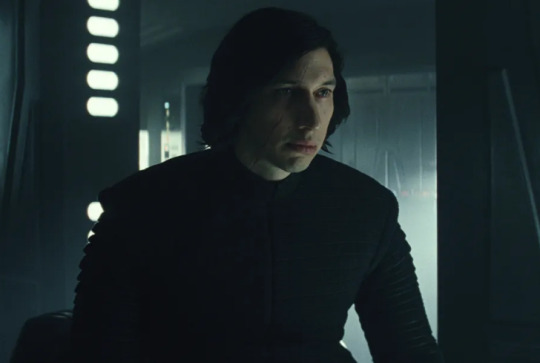
The film reveals that the final push towards the “dark side” was when Ben Solo awoke to see Luke standing over him with his lightsaber while he was sleeping. Without considering the possibility of a miscommunication, Ben Solo brought the roof down on the last Jedi, and then systemically went about converting or eliminating the rest of the students in Luke’s school before burning it to the ground. From there it can be presumed that he officially took on the role of Snoke’s apprentice, dubbing himself Kylo Ren as he joined the ranks of the First Order.
The problem is that it doesn’t matter. There’s nothing relateable about being a white adult male who decides to sign up with a Nazi organization and the very premise that we should try to have sympathy for such a character is chilling, especially when you consider that he murdered Han Solo not more than a week prior in film time.
(PUTTING THE REST UNDER A CUT)
But there’s another element to Kylo Ren that makes him harder to relate to. He comes from a place of privilege in society. Ben Solo was born to two war heroes, and while those might be big shoes to fill, there’s nothing that would indicate that Han and Leia were terrible parents to their son. In The Force Awakens, Leia admits that she sent Ben to train with Luke because she feared Snoke’s growing influence on her son (turns out, she had a right to be concerned). In Chuck Wendig’s canon novel, Empire’s End, from the Star Wars: Aftermath series, we see Han excited, if not a little daunted, about the possibility of becoming a father.
In other words, there’s nothing relateable when you think about a wealthy white male growing up sure of his place in the world and deciding to leave it all behind to join a fascist organization.
Compounding on this, there is someone who is relateable: Finn. Finn was not born from a place of privilege. If anything, we still know very little about Finn’s origins aside from the fact that he was abducted from his parents and raised to be a Stormtrooper. Despite years of conditioning and being ranked as the top cadet in his class, Finn was able to maintain his sense of self and when it came down to his first battle, he decided not to shoot and kill an unarmed villager.
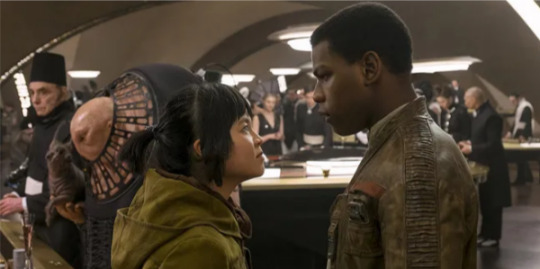
This is the character that most people should be able to relate to. Finn is a character that isn’t sure of his place in the world. He grew up with the First Order and left everything that he knew behind him in order to try to do what he thought was right. Although he initially planned to seek a quick exit from the conflict at Maz’s castle, he didn’t hesitate to rejoin the struggle when he discovered that Rey was in danger. Finn spent most of his time in The Force Awakens running away from something – the First Order, from Jakku, from delivering BB-8 to the Resistance, but we see his progression throughout the movie to the point where he risks his life for Rey and helps the Resistance destroy the Starkiller base. At this point, Finn has rightfully earned his status as a hero.
Until The Last Jedi where Finn is again painted as selfish and cowardly, and the film does not shy away from this fact. Initially branded as a traitor by Rose when he tries to get the beacon as far away as possible to prevent Rey from falling into a trap, he is consistently belittled by Rose throughout the film. She consistently calls him cowardly and self-centered, and Finn’s characterization seems to shift in order to fit this description. When Finn is explaining his plan on hyperspace tracking to Poe, he is excited and confident: he can do this. When he gets to Canto Bight, he suddenly regresses, becoming immature and distracted by the glitz and glamour all around him. Finn knows what’s on the line. Rey is on the line. Poe is on the line. The Resistance has less than 24 hours, and yet he suddenly becomes bumbling and distracted.
This becomes Finn’s character throughout the rest of the film. Brash, impulsive, and worse, being frequently portrayed as the butt of everyone’s jokes. When we first see Finn, he is wandering about the halls of the Resistance in nothing but a bacta suit, as if Finn has suddenly forgotten how to care for himself. The film plays into the stereotypes that many people have about black male individuals. Instead of being treated as the hero of the Resistance, Finn is relegated to a comedic side role based on slapstick humor and unfunny comedy that ultimately doesn’t contribute anything to the plot.
In other words, Finn’s side plot reflects the film’s stance of diversity: we’ll wave it in your face for a few minutes before we wave it aside to make way for the two white protagonists. It’s a bold statement, but not untrue. Rian Johnson first joked that it would be “funny” to leave Finn in a coma for the entire film: “We did at some point joke that it would be great to just have him be in a coma for the whole movie and keep cutting back to him.” He explains that each of these cuts back to Finn would have him uttering some nonsense in his unconscious state, and at no point in the entire run time of the movie would the former Stormtrooper wake up.

When John Boyega first accepted the role of Finn, JJ Abrams told him that he was going to be the new star of Star Wars. Rian Johnson blatantly admitted that it would be “funny” to simply delegate the black lead to the sidelines, where he doesn’t have more than a few scenes of incoherent babbling to serve as comic relief.
Not to mention, it’s Rose who ultimately has to teach Finn about the seedy belly of Canto Bight and how it operates: through slave labor. Another character shouldn’t have to explain to Finn, of all characters, the tortures and ills of slavery. After all, that’s the only life Finn’s known, taken as his family and raised in a life of servitude as a Stormtrooper to the First Order.
The underlying racism in The Last Jedi does not, unfortunately, stop with Finn’s character. We know a lot more about Poe Dameron’s character from the popular Poe Dameron comic series that highlights Poe’s adventures with Black Squadron before they find Lor San Tekka.
In fact, Poe’s arc is highlighted by its racism, as Poe’s character is reduced to a mere stereotype of his ethnicity. From the Before the Awakening, piloting flight logs, and comic series, we have a complete picture of who Poe is as a character. He tells L’ulo, “I’m the best. But you’re the best too” which highlights who he is as a person. He is a gentle soul that sees the best in people, trusting Finn not only to help him escape, but to lower the shields on the Starkiller Base when he said he could. Poe is a genuine nice guy who would give the shirt, er, jacket off their back to help a stranger.

And we see absolutely none of this in The Last Jedi.
Poe is described as rash, dangerous, and aggressive by Vice Admiral Holdo, played by veteran actress Laura Dern. She’s dismissive of him, and while a part of it does play into more harmful stereotypes that I’ll get into later, in this instance, it’s hard not to. In the opening first scene, Poe is prepared to let everyone, everyone die just to take out a First Order Dreadnought. Even though successful, Poe seems more focused on the success of his mission than the countless deaths of his fellow Resistance fighters.
And that is not who Poe Dameron is. To say so makes a complete mockery of a fantastic character whose character has already been set and esteemed by fans. Changing his character to comply with stereotypes in order to try to advance the plot isn’t “moral ambiguity” or “challenging the character” – it’s just bad writing.

In short, Poe becomes aggressive, dangerous and hotheaded, all to fulfill the stereotypical role that the narrative wants him to play. His character attitudes are changed in order to fulfill a plot device, and that’s the conflict set up between himself and Vice Admiral Holdo.
This conflict is disappointing. It focuses on a female leader putting an aggressive, chauvinistic male in his place. It’s supposed to be empowering, but it’s not, especially when you have to have one character act so differently in order to get to that point. The problem is that the kind of feminism this movie is preaching is white feminism, which is dangerous in and of itself.
But what does white feminism mean in this case? Vice Admiral Holdo, and even Rose, both undermine and belittle Finn and Poe, treating them like children. This concept of infantalization upholds racist stereotypes of black and Latino men being both incompetent and irrational. In Poe’s case, it works to also uplift the alleged moral superiority of white women over people of color. And it’s not feminism.
It’s just disgusting.
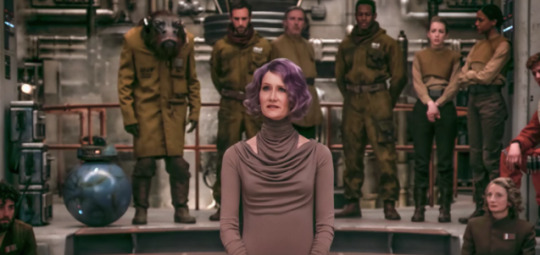
Holdo is held up as someone that people in the Resistance are supposed to respect as a leader, and yet she refuses to tell the very people she’s leading what their plan is, citing Poe’s earlier reckless actions as an excuse. Even according to the Navy’s Leadership Principles, keeping your people informed is the second principle on the list. In other words? It’s pretty important. Vice Admiral Holdo’s refusal to do so is driven by petty motives, and while Poe is painted as ridiculous and childish the entire movie, he’s actually proven right when the First Order does the very thing he was afraid they would do.
One of the “lessons” from Poe’s story line is you should always blindly trust authority figures even when they provide no valid reason for doing so, and this is an extremely dangerous and topic example to set, especially in today’s society when people of color are so often made targets of police brutality, which again feeds back into the movie’s underlying theme of systematic racism.
Holdo herself seeks redemption from her mistakes by turning around and ramming her ship through theirs – an admittedly cool move, although it would be cooler had we not seen Admiral Raddus suggest the idea of plowing through a ship no more than a year earlier – and dies so that Leia can explain to Poe that Holdo was a good leader (without really stating how) because she was more concerned with fulfilling the mission without getting credit for it.
The problem with this? It means that Holdo had to die in order for Poe to “understand” what it meant to be a leader. This doesn’t work for two reasons. For one, Poe is a decorated Commander who had already served as a leader in the Republic Navy before joining the Resistance. Painting him as a cocky flyboy with a chip on his shoulder just doesn’t work when it goes against everything we’ve been told about his character. The “lesson” Poe was supposed to learn was one he already knew.
The second problem is that it meant that Holdo had to die in order for Poe to learn this lesson. In other words, we’re back to that age-old trope: a woman had to die in order to advance the plot/characterization of a male character.
And that’s where we get to our final topic: sexism. For a movie that preaches itself as so overtly feminist, it is rich with sexist undertones that are immediately apparent on the surface. Most of these are notably in the interactions between Rey and Kylo Ren, but there’s another character that I wanted to touch upon first. Rose Tico.
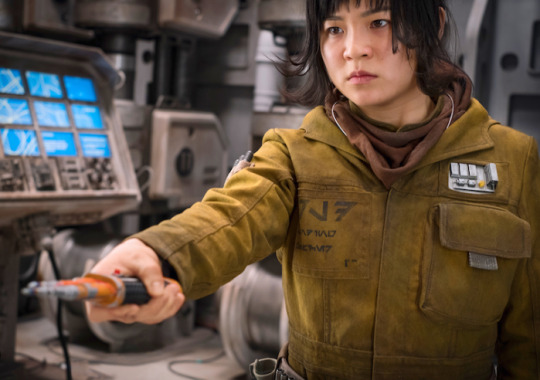
Despite Kelly Marie Tran’s boundless enthusiasm for her role, Rose Tico is ultimately underwhelming as a character. Despite mourning the death of her sister, her ultimate presence in the film seemed to be reduced to a girl with a bad crush on Finn.
I’ve already touched upon how poorly Rose treats Finn, but Rose herself seems to have gotten the short end of the stick in terms of the plot. Her character exists only to serve Rian’s image that your heroes aren’t what they seem, tazing Finn when she sees him trying to escape. From then on, Rose’s status seems to be downgraded to “Finn’s crush” as seen in the description of this deleted scene:
Originally, the film spent some more time clarifying the dynamic between Rey and Finn, and further setting up Rose’s crush on the Resistance “hero.” Rose chastises Finn for “pining for Rey,” which Finn quickly denies, claiming that he was “raised to fight” and that he finally found something to fight for in his friend, Rey. “Whatever,” responds Rose with a hint of jealousy.
Rose’s constant nagging of Finn and being catty about Rey enforces a negative female stereotype that has no business in a Hollywood blockbuster that claims to be catered to young girls, especially when it seems that Rose’s role has been reduced to working the love triangle dynamic between Finn and Rey. This seems like it could only lead to a destructive end for the character, especially considering how she attempts to save Finn’s life by almost sacrificing her own at the end of the film. Rose presents us once again with the trope that a female character must sacrifice herself in order to advance the plot of the male character, in this case, to prove her love for him. It’s a frustrating trope, made all the more exhausting when you consider what her role might be in the next film.

If you focus on the look Rey gives Finn putting a blanket over the unconscious Rose, it sets up tension for the next film: assuming Rey and Rose engage in competition for Finn’s attention, putting the two girls at odds with one another.
Because if the sexism in this movie wasn’t blatant enough, that’s just what Star Wars needs: two girls fighting over a guy. While frustrating to watch, it’s also extremely degrading to both characters and reduces both of their arcs into nothing more than instruments to direct the story of a male character.
Hopefully JJ will take the next episode in a different direction, but the damage that has already occurred in this film cannot be understated. There is, unfortunately, a lot of ground to cover regarding Rey’s story, so I’m going to start with the most visually striking one: Rey’s costume.
In The Last Jedi, Rey adopts what has been dubbed her “Jedi Training” outfit, trading out her three signature buns for a simpler hairstyle and trading out her light Jedi garb for a bit of a darker color. It’s a way for Rey to separate herself from the girl we saw crying desperately over her parent’s retreating ship on Jakku, keeping the same appearance a decade later in the hopes that they would come back to recognize her.
Many who speculated that Rey would undergo this physical transition after she discovered the true origin of her parents and worked to free herself of that disappointment found themselves disappointed. Rey didn’t change her clothes and her hair after she learned about her parentage from Kylo Ren, she learned about it after.
Despite being wet from the rain, another reason for this change is that she was shipping herself off in a box to see Kylo Ren, prompting those who want them to be romantically involved to start citing the Snow White parallels. It’s not hard to believe that the reason for this change was to make Rey appear more feminine. With her hair down, she looks more like a girl and less like the hardened warrior who had to fend for herself back on Jakku.

But wait, wouldn’t that mean that Rey’s entire role in the movie basically focused on developing Kylo Ren as a character? It does, and you wouldn’t be wrong to think that way. Even during Rey’s training sessions with Luke, the conversation is always geared back to Kylo Ren in some way, whether it’s Luke talking about his past or Rey assuring Luke that she won’t end up like Kylo. Either way, we hear Kylo’s name spoken more times between them than we actually hear anything about the Jedi or the things that Luke learned about the Force on his travels (say, Pillio, perhaps?)
It becomes clear early on that despite Rian Johnson saying that the film isn’t about what the fans want, that certain scenes were added in to appeal to a certain demographic. For example, Adam Driver’s uncomfortable shirtless scene?
Rian himself says that the scene had a “specific purpose” of creating an increasing feeling of “uncomfortable intimacy.” In other words, Kylo Ren’s shirtless scene is basically synonymous with a dick pic: no one asked for it, but there it is, one of the most subtle forms of sexual harassment. Think about this another way: if Rey’s character was really a boy, would the shirtless scene still be present? Or necessary?
Hint: it’s not.
The fact that Rey’s character only seems to exist to play a role in Kylo’s story is concerning, considering that she is touted as the protagonist of the sequel trilogy. Even though she witnessed him murder Han Solo no more than a few days prior, she becomes emotionally intimate with him pretty quickly, opening up to him about the strange experiences she had in the “dark place” beneath the island.
And therein lies the problem. When they touched hands, Snoke gave her a vision of Kylo Ren turning back to the light side to compel her to rush off to the Supremacy in the hopes that she could turn Kylo Ren back to the light and turn the tide of the war.
There’s only one problem with that.
It’s not her problem.
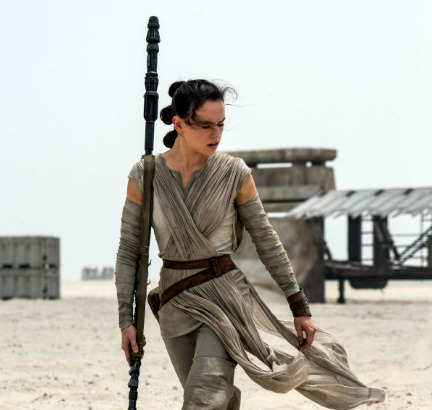
Rey was a civilian. As Kylo Ren himself told her, “You have no place in this story.” She has no part in the conflict between the First Order and the Resistance, and yet she was swept up in it all the same. It shouldn’t be necessary for her to rush off and turn the tide of the war, and while it fits with the Star Wars theme of how one person can make a difference, the trope that a woman must rush off and sacrifice herself in order to progress a man’s character and offer him redemption has been a long-running frustrating trope. If Rey wants to help the Resistance, that’s her choice, but it shouldn’t be necessary to rush off and try to save the person who kidnapped and abused her.
It’s one of the things that makes any sort of Kylo Ren and Rey team-up so off-putting. In The Force Awakens, he kidnaps her and invades her mind in order to try to find the location of the map. After she escapes, he confronts her in the forest, throwing her into a tree several feet up in the air in a move that could have potentially killed her. Then she wakes up just in time to watch him slice through Finn in a move that could have killed him.
Oh, and did I forget to mention how she watched him murder a defenseless Han Solo right before her eyes only moments before? The man who, as Kylo himself taunted, presented a father figure that she never had?
In other words, Rey has absolutely no reason to trust Kylo Ren. She has no reason to even want him to get redemption. For all of Rian’s talk about how he wanted to keep this film “morally grey,” trying to make a genocidal murderer relateable, or even redeemable, was not a step in the right direction. Wouldn’t it have been more compelling to watch Rey wrestle with the ramifications of eliminating Kylo Ren once and for all? Instead of trying to find redemption for the dark side, wouldn’t it have been far more interesting to explore a situation in which Rey realizes that good people must sometimes do bad things for an overall good to result?
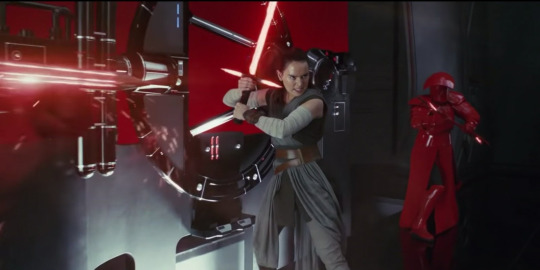
Perhaps, but that’s not the film we got. Instead we got a team-up between Kylo Ren and Rey where, moments after they work together, their alliance is quickly severed. Rey asks Kylo to call off the attack that is sure to eliminate the Resistance, including Finn. Kylo, however, refuses and tells her to move on and join him in ruling. He tells her, “You come from nothing. You’re nothing. But not to me.”
Fortunately Rey grabs the lightsaber and rejects his offer, and the final scene of her closing the Millennium Falcon doors on him seems to confirm that she has severed her connection for good. The problem? The damage has already been done.
Rian Johnson has already set up the Kylo Ren and Rey dynamic to be potentially romantic, between the shirtless scene, the hand touching scene, to be filled with an uncomfortable kind of sexual tension between the girl that declared to Maz, “I don’t want a part of any of this” and the man that murdered his father.
As troubling as that notion is, it does get worse. Kylo Ren tells Rey, “You come from nothing. You are nothing. But not to me.”
The problem is that Kylo Ren’s frequent gaslighting and emotional manipulation throughout the two films reaches its climax: he has discarded Snoke and wants to use the powerful, yet naive Rey, to further his own power. Still, the sexual if not romantic implications are there, pushed along by a group of shippers that call themselves “Reylos,” who desperately seek for Rey to redeem Kylo through, well, you get the idea.

There are several problems with this. One of the first ones is the fact that Kylo Ren is 32 years old, whereas Rey is only 19. While many are quick to claim that age is just a number, Rey is emotionally immature, having been isolated on Jakku for most of her life. There is absolutely no good reason to try to push her into any sort of relationship with someone who is so destructive, especially when the sole reason for doing so is to help Kylo Ren find redemption.
The line, “You’re nothing…but not to me” is a quote that unfortunately most women have heard far too often. It’s an emotional manipulation tactic in order to try to isolate a woman from her friends and family until she only relies on her abuser for support, and this is exactly what Kylo Ren is trying to do here. With Luke unwilling to teach her, Kylo wants Rey to rely on him, and solely him, so that he can use her power and manipulate her to further his own goals (which is to lead the First Order to…conquer the galaxy? It’s not quite clear.)
It’s a frightening message, especially when you think about who this movie is supposedly marketed to. Think about how many children dressed up as Rey for Halloween. How do we explain to girls that the man who killed Han Solo, the man who emotionally manipulated her and tried to use her just to validate himself, is the person that she should ultimately fall in love with? It paints a dangerous picture that girls internalize before they have enough experience to make their own decisions regarding their own relationships.
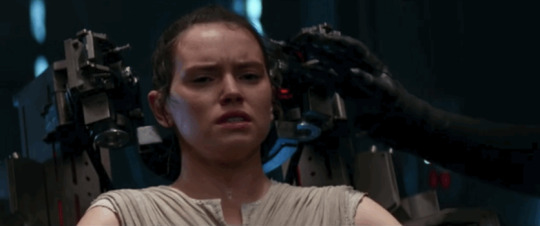
Remember Edward Cullen’s creepy manipulation in Twilight? Apparently that’s crept into Star Wars as well.
And this gets to the heart of the overall problem. The Last Jedi is ultimately soaked in sexism, misogyny and racism, and yet Kathleen Kennedy and Bob Iger widely praised the film before its release. How can Kathleen Kennedy, who said that she was proud to have a feminist icon in Rey, be willing to reduce Rey’s entire story to “the love interest?” If the executives and storygroup approved such blatant racism and actively worked to rewrite characters in order to fit their stereotypical narrative, what hope do we have that the next trilogy will be better, especially when they gave Rian Johnson full control over its content?
Rian himself believes that Darth Vader was worse than Kylo Ren, and while that is probably a conversation as controversial as the movie itself, Rian still wholeheartedly believes that despite what happened in The Last Jedi, that Kylo Ren can be redeemed. It shows that the storyline that JJ Abrams set up has been reduced to simply furthering the narrative of the white villain, and the rest of the characters are simply players in his story, which is why they exist as nothing more than stereotypes in Rian Johnson’s version of Star Wars.
And that’s the disappointment. While The Force Awakens received criticism for being too similar to its predecessor, A New Hope, JJ did set up some interesting and mysterious characters. While Captain Phasma’s role was ultimately underwhelming, fans were assured that she would have a much bigger role to play in Rian Johnson’s world.
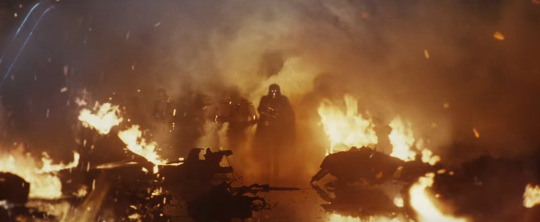
Unfortunately, we all know how that turned out.
Phasma’s quick dismissal wasn’t the only disappointment. Snoke was killed off without any satisfying explanation to who he was or even what he wanted the First Order to do. The Knights of Ren, which were mentioned in The Force Awakens and played a role in Rey’s vision, disappeared from the narrative entirely, instead being replaced by Rian’s Praetorian Guards.
For many, Luke Skywalker’s return was the biggest disappointment. Mark has made no secret in recent weeks citing how he didn’t agree with Rian Johnson’s vision of Luke and how he wished George Lucas had directed the sequel trilogy instead, a mere three days before The Last Jedi hit theatres. It fits into Rian Johnson’s grim version of reality: our heroes can be defeated, and idolizing legends is ultimately unsettling and disappointing when faced with reality.
But by disappearing into the Force, did Luke not himself become a legend, the very thing that Rian seems to chide against? The film’s “message” seems to give audiences such mixed signals, it’s not surprising that audiences claim that the film seemed better after a second viewing: basic elements of the plot just doesn’t make sense, like how the First Order has suddenly developed hyperspace tracking despite the film only taking place a few days after the events of The Force Awakens.
There are other plot holes that point out the flaws in logic in the story: where did Rey learn to swim on Jakku? How can bombers drop bombs in space when there’s no gravity for the bombs to fall? Since space exists in three dimensions, why didn’t the First Order just have a ship drop out into hyperspace in front of the Resistance Star Cruiser and blow it to bits? And why was General Hux, a serious, straight-faced villain in The Force Awakens, who ordered the destruction of the Hosnian System, delegated to a comedic side role who’s only function was to serve as a cheap laugh and be the butt of an awkward your mom joke? Instead of using the antagonism between Kylo Ren and General Hux to show the crumbling of the First Order and how the small band of Resistance heroes we’re left with at the end of the movie might stand a chance against them, it seems that the First Order’s army, which was flowing with Nazi imagery in The Force Awakens has just been reduced to campy slapstick humor.
Despite these obvious problems, the most glaring ones still remain in the fact that Star Wars is a film that claims to market itself to the people it exploits and ultimately rejects. It’s no wonder that merchandise and ticket sales have dropped when the movie is back to focusing on a white male lead, like so many other before it. Kylo Ren tells Rey that you have no part in this story, that she doesn’t belong – something that minorities, women, and the LGBTQ+ community have been hearing their whole lives.
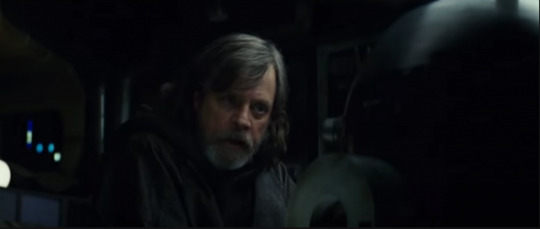
But if this movie isn’t made for these people, then why does Disney keep trying to insist that it is? Most people who have been critical of the film have been met with the chorus of, “You’re just upset that you didn’t get what you wanted” as if it’s somehow wrong to expect more from what you receive. The story was set up so that we would get answers. How someone as powerful as Snoke managed to manipulate Kylo Ren from the womb and grow the First Order from the seeds of the Empire, Phasma’s increased involvement, and especially the question of Rey’s parentage, has been dangled in front of us like a carrot on a stick for the past two years, and it’s ultimately unsatisfying to see all those threads being clipped off and brushed aside with a, “Oh! It didn’t even matter!”
If it didn’t matter, then why feel the need to keep up the secrecy and suspense for two years, when the final product is ultimately disappointing? (Point not withstanding, Kylo Ren tells Rey that Snoke showed him that her parents were buried in a pauper’s grave on Jakku. Why her parents would actually return to Jakku, or whether Snoke was actually telling the truth, is a matter that JJ has yet to resolve.)
It’s not wrong to be a critical consumer of the media that we consume. It’s not wrong to say that we deserve something better. Minorities and women can and should demand to be treated with more respect than they were shown in this film, and the overwhelming amount of racism and misogyny in this film is something that most avid fans of the film have not provided an answer for.
People who claim that The Last Jedi is a good movie, while at the same time acknowledging how deeply misogynistic and racist it is, are contributing to the larger problem we have as a society. It’s saying, “I know it’s racist and misogynistic, but it entertained me, so I’m okay with it.”
It might just be fiction. It might just be a story. But all media we consume influences us, subconsciously or not, in ways that we may not even be aware of. Star Wars may not be real. These characters may not be real.
But it still affects how you feel, and that seems pretty real to me.
#anti-tlj#anti-the last jedi#anti-disney star wars#star wars negativity#star wars sequel negativity#star wars#why the last jedi isn't just bad - it's toxic#last jedi toxic#the last jedi is toxic#tlj toxic#tlj is toxic#scavenger's holocron
45 notes
·
View notes
Text
Objection! Yet Another "In Defense"
Okay! My alarm bells went off and it has come to my attention that yet another user has posted a "Jotaro is a misogynist" allegation post. Since Yoongi ain't raise a weak bitch, I am here to give my own counterarguments to the post in more comprehensive detail.
This will be my "Should pineapple be on pizza or die" / "Is mint chocolate actually good or is it the spawn of Satan" type of debate.
I am going to die on this hill that while he is in fact a man of many, many flaws, misogyny is not one of them no matter how convinced some people think he is. I will live up to my bio and that's the truth.
But before I begin, I'm going to put up a couple disclaimers because if I know the Internet, people love jumping the gun almost immediately when encountering someone who has a different opinion than theirs.
Disclaimer #1: Whatever I state (or even what OP has said), is all within the realm of HEADCANON because we aren't Araki. We did not make the canon universe, so all my yapping will be assumptions based on the material presented to the audience. Disclaimer #2: I am in no way shape or form fighting OP, alright? These are just my rebuttals against the arguments she has mentioned. She's entitled to her own opinion. I'm entitled to mine. 'Tis but a food for thought of mine. Spicy edition. Disclaimer #3: I don't want anyone commenting/reblogging this saying "lmao don't you have anything better to do than to argue with people online?" Because I just finished a whole day's worth of examinations, for which I studied a whole week, and got good scores from it. I can do whatever the hell I want during my resting period, anonymous user. Even if it's making this huge ass post defending my hyperfix. Thanks.
With that out of the way, let's get on with the meat of it all.
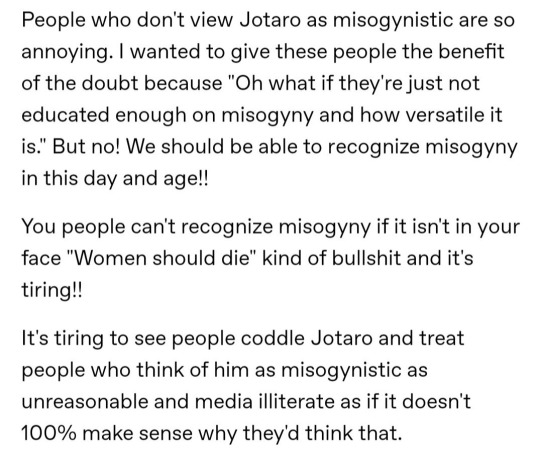
"You people can't recognize misogyny if it isn't in your face "Women should die" kind of bullshit."
Oh I'm aware. Bold of you to assume that we don't know how deep and how silent misogyny can run in today's society. More so in Asia and the Middle East.
And it's slightly insulting to assume that because I want to defend a fictional character and that he isn't misogynistic popularized via memes, you say that "Oh! You don't know misogyny at all! It's annoying!"
You say that because I know in the West, misogyny is the more "in your face" and obnoxious type. But as an Asian woman, I very much know the levels of audacity men can harbor against women that aren't just limited to, as you quote, "Women should die" behavior.
Misogyny is similar to a spectrum. It can be as obvious and proud as the Andrew Tate's, the "Alpha" men, and the basement-dwelling incels. It can also be as quiet and condescending as a regular guy in your day-to-day. They won't preach toxic masculinity, but would instead infantilize, belittle, differentiate, or alienate women and see them as someone inferior to the male sex.
I can sense red flags. I'm hypervigilant about how men behave around women and whether they see them in a different, negative light. So I know what the hell this word means.
And I'm not saying OP is one (I genuinely don't), but women can be misogynists too. Ironic, I know but they exist. Some women are drawn to misogynistic men as well. Booktok is an example of that.
Phew. With that introduction out of the way, let me first make my little assumption on why this whole debacle started before I start breaking down each argument.
When you look at it from a bigger picture, he doesn't get to interact with many women in this series with an abundance of male characters. So it's easy to jump to conclusions about their stance on it when you decide to base a whole character on the beginning episodes.
I think the reason why some people are convinced that Jotaro is an "anti-woman" is because he yells at women... for the first few episodes. Let me see what else. *Flips note* Oh, that's primarily the reason. Okay.
What bad things had he done? Called Holly a bitch and yelled screaming girls to shut up. That's it. Any other things I left out was intentional because I will be discussing that separately.
I won't expand on the whole "but Part 3 happened because he loves his mother" shtick because it's in the first argument. But when you come to think of it, he doesn't really say "bitch" as much as people expected him to outside of Holly. He doesn't even say it unwarranted or like he wants to.
Onto the screaming flock of school girls. Before he tells them to shut up, here's what happened. They congregate, start calling for his attention, and one of them grabs his arm.
What does he do? Does he yank his arm off in disgust? Does he shove her even slightly? Does he tell her to "back off bitch" or "get the hell away from him?" No.
He simply looks at her and does nothing. Ignoring her so to speak. Because he doesn't like the attention of being seen as a piece of meat for them to ogle at. He only tells them to shut up when they start becoming obnoxiously loud.
"But he was very rude and pushed those two women on the plane!"
Ma'am/sir, they're on a plane about to crash unceremoniously into the ocean, and the flight attendants decide to prioritize fawning a minor over their own lives. In the process, they block his path to the cockpit. Who wouldn't get frustrated in a situation like that?
Onto the arguments:
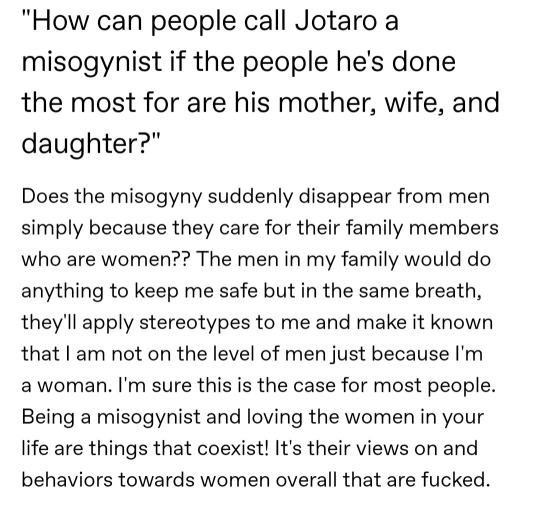
I agree that there are misogynistic men who can still love their female family members but still be an "anti-woman" towards others. But I can cite examples on how he interacts with women who aren't family in contrast to how a misogynist would.
Case A: The School Nurse
And we have one of our first earlier examples from Episode 2. When we first meet her, he's sitting in the infirmary and she's there almost giving him a light lecture about getting into trouble. He wants his knee patched up and she's about to do that because that's her profession.
How does he behave around her? Does he show body language signs indicating he's undermining her skills as a nurse? Does he call her a nagging bitch for lecturing him? Does he dismiss her words?
No. He evades her hands from reaching his hat, and when she's about to snip his expensive pants he reasonably asks "what are you doing?" She explains her intention and he sighs, simply saying that he'll take them off himself.
Does he show resistance? No. He does what is told so his knee can be treated.
AND after Kakyoin reveals himself, he gets pissed at him for using the nurse as a puppet, saying his whole speech and ending it with "Especially if it's an innocent woman!"
I've seen some use this sentence as him being misogynistic because they perceive it as a sign of belittlement when in actuality, it's not.
You have to know that he lives in 80s Japan- Patriarchal Japan where women are most likely going to be treated less than men in general even up to today's day and age. (I doubt you've heard but there's currently active crimes against women in Korea. If shit can happen there today, it can happen in Japan too). Let's face it and I hate to say it but it's the truth: Women are part of the minority. That's a reason why gender equality rights are being fought for, and why feminists exist to begin with, as well as the creation of the MeToo movement.
Jotaro knows women are more prone to be taken advantage of in this country, more so during this period. And he hates that. He despises that. Hence why he responded with such words to Kakyoin with that much vitriol.
He acknowledges he's not a perfect guy, that he's a punk true and through, but he has enough dignity and moral values to see that when one portrays women as lesser than men and uses them for personal gain, it's vile and evil.
Case B: Anne
Miss little stowaway! Let's see his behavior around her. OP has mentioned her at the ending, being on the fence and all, so I'm here to shed some light.
Back in the boat when she's still posing as a boy, how does Jotaro see the situation: It's a child in the middle of trouble. He looks at it not through the lens of "I applaud this boy for fending himself", but more so through "People are already intervening so I'm gonna sit this one out."
She goes overboard and he jumps in to save her. And then he finds out Anne's a girl. Does he think differently of her? No. She's still a child who needs saving.
He becomes her passive big brother figure. He wants to assist her off the small boat, but she declines and sticks a tongue out, and he sighs. Saw someone's head get mutilated? He shields her eyes. Anne is getting inappropriate attention from an ape? He intervenes and sees the orangutan as a disgusting animal, both in a literal and figurative sense. Falling off a cliff? He safeguards her. Caught in a dead end? He helps her with a quick "good grief".
Case C. Tomoko
Another example! But let's switch it up a bit to Part 4 this time. A testament on how his personality was really just him being a teenager going through an identity phase, replacing that punk persona for professional stoicism.
When he visits her house to look for Josuke, he meets her. She sees him, thought he's Joseph, and immediately goes in for a hug, motorboating his chest with a string of "Love you's" spilling out in that pitchy voice.
Does he call her a bitch? Does he pull her away because she violated his boundaries? Does he make some belittling comment about her behavior in his mind?
No. Jotaro stands put, gets put off because she's all up on him rubbing her face on his chest, tells her frankly to look over him again and says he's not Joseph.
And then he asks if Josuke's at home. Tomoko's zoning out. And what does he do? He doesn't groan. He doesn't roll his eye at her blanking out. Instead, he notices she isn't responding so he repeats his question to her face with the same polite tone so he can snap her out of her thoughts.
And when he leaves, he says one more thing to her. It's easy for anyone to say something along the lines of "Toughen up, it'll get better" / "It'll pass" / "Hang in there". But what does he say instead? He offers condolences and mentions that if Joseph was less senile, he'd support Tomoko, knowing that she's been wanting to meet the old man again.
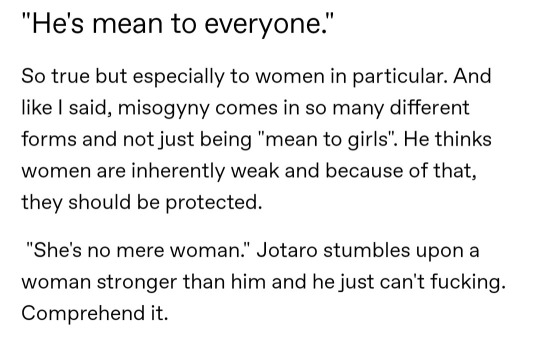
Yes. That's because he is mean to everyone. Equally. Hell, I think he calls men "bastards" more often than he calls women "bitches". In which part of the show did he show any sort of condescending remark that women were weaker? How often does he spout out "bitch" in the entirety of the show?
He protects them because, for one, his enemies have supernatural abilities that ordinary civilians can't see. Which one will make him more of an ass? Protecting them or turning a blind eye?
It's like saying that a man shouldn't help a woman struggling with her heavy luggage up the staircase because "Hey aren't we all equal? They should struggle as much as we do!" Which is such an asinine concept to adhere to.
It's not seeing them as weak. It's called having basic human courtesy. He's going to help because they're people who need help, not because they're women in need of saving.
How is that any different from him wanting to protect Koichi? From him wanting to protect Josuke?
"She's no mere woman. Jotaro stumbles upon a woman stronger than him and he couldn't comprehend it."
OR.
He knows something's wrong with the nurse so he makes that comment. "She's no mere woman" as in "She's behaving erratically than what a normal person should be behaving." Man or woman. She has a welcoming personality so of course he'd be thrown off guard when suddenly she's stabbing students in the eye and cheeks with unnatural strength.
And the way you worded this was as if you're saying Jotaro is allergic to strong women. When it wasn't the case at all. In part 3, he fights against strong women Stand users (Enyaba and Midler) just like he does with the male enemies. In part 6, he teams up with strong women Stand users (Jolyne and Hermes).
He even outright states and believes that Jolyne can make it through the chaos because he knows she's strong and capable. He's proud of her strength and abilities.
Again, in which part does he not comprehend that women can be strong? That it's so mind-boggling to the extent you had to include "fucking" to emphasize your point?
In fact, I think he'd respect and appreciate a woman who knows her self-worth and power. Sees a successful female colleague? *applauds in stoic.*
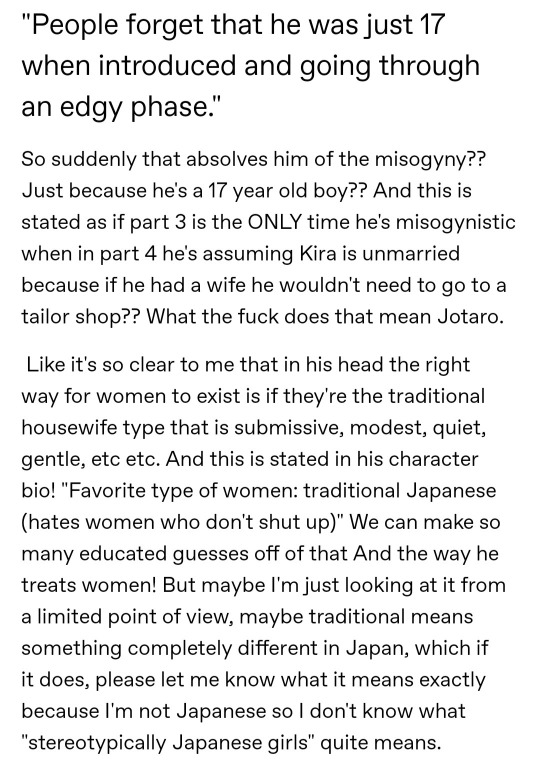
Again, I agree that age does not excuse anyone to be misogynistic. It can happen at any age. Because it's a mindset. It's rooted deep in the psyche. But I've already made my case about teenage Jotaro so I'm not gonna reiterate.
With the whole Kira deduction thing in Part 4.
Let me restate this- The time this part was set in is the late 90s. Setting? Japan. A patriarchal country where gender roles were more rigid and inflexible. During that time, I hate to break it to you, but the country was not that expressive nor progressive as compared to the West. It was common for women to be housewives doing the chores and tending to the kids, while men did the heavy labor out of the household.
So you cannot blame Jotaro for making that logical deduction. He was born in Japan, knew by then how his country works at 28 years old, and thus is able to make a deduction based on the patterns of how society was structured during that period.
Sure you could say some women worked too, but the majority of them would be the typical housewife. In 80s-90s Japan I say again.
"Traditional Japanese"
This, fellow readers, is what you call a "Preference". It can be harmless and not necessarily condescending. But even then, with the inclusion of the parenthesis, you could say that this was a choice based on the mindset of a teenager's train of thought.
Jotaro likes his quiet time -> learns from the world that apparently traditional Japanese women are usually the "quiet types" -> resulting in the aforementioned preference.
And just like any other preference, it can change with time as you grow older and wiser. As you can see, he dates and marries a foreign woman who's not "traditionally Japanese" and even had a kid with her.
It doesn't necessarily mean he wants a housewife who can cook and clean for him. At the age of 17, that's the least of his concerns. All he wants is for his partner to know when it's appropriate to be quiet and when it's appropriate to be excited. He prioritizes his peace. As simple as that.
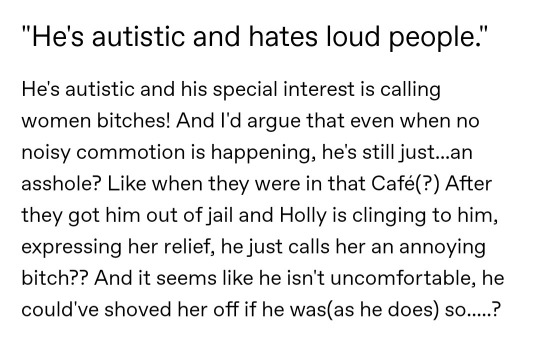
I can see why people like to see him as part of the autism spectrum and I respect that.
And yes, I acknowledge that he's a huge asshole. No denying that. That's just how he is at that age.
And again, we don't see him say "bitch" that much anyways for it to be a verbal stim of sorts. I recall he says it twice or thrice. And that's it.
Personally, I'm not that sold into the headcanon (and this is coming from someone who probably has ADHD and has a sibling diagnosed with autism). Introverts can be callous. Some can look apathetic. Not every one of us will be shy and timid.
"He could've shoved her off."
And you know why he doesn't? Because as much as he tends to bark and yap about how annoying and doting his mother is, he loves Holly. He likes her hugs. He lets her give him goodbye kisses to the point it has become a pattern in his life. He likes her cooking. He's going to travel the whole world for his sick mother to get better.
And Holly knows that. A mother knows her child more than anyone else. She's unfazed by his words because she knows the good son she raised underneath that tough abrasive persona. Heck, even Suzy Q knows that too.
Also a cute little assumption. After they fight Midler and after Suzy talks to Jotaro, you can see his hand lingers on the phone. It's as if he's contemplating. I'd like to think that's a moment where he wanted to call Holly, to check up on his mother.

I agree that being gay doesn't excuse someone from being misogynistic. Like I said, it can happen to anyone of any gender or age.
Gay people can be misogynists. Point blank period.
Personally, he's a demisexual king in my eyes. But others are free to give him any orientation they see fit. Gay, trans, bisexual, aroace- You name it. The fictional world is your oyster! Go ham!
I believe that a fictional character's sexuality is a headcanon in on itself unless explicitly stated by the creator. Telling someone that character is straight? Headcanon. That character is gay? Headcanon. Claims a character to be non-binary? Headcanon.

"He's just a baby boy uwu uwu"
Okay OP with the "we're infantilizing him" allegations! That's new!
(That... was passive-aggressive of me. Apologies. I'm aware we call him "baby girl" often but with the way those two words were put into that sentence combined with the emojis gave off a different connotation.)
I don't know why but whenever we say that Jotaro isn't *insert one negative trait*, y'all are quick to say that we are proclaiming that:
"Oh my god~ He's not like that~ He's Saint Peter coming from the heavens pure as light."
Like what? No seriously... what??? I have never seen anyone treat him like he's the perfect human being.
Hell, I can even say that he's NEGLECTFUL. Yes! He's a neglectful father no matter how good his intentions were. He was an absent parent who technically neglected his child. There! I said it!
We KNOW he's an asshole. We KNOW he has a multitude of flaws that are not admirable. He's reclusive as fuck. He's brash and abrasive. He's seemingly distant when he talks to people. Socially awkward outside of work. He's impulsive when he wants to be.
I love character flaws. That's what makes a character so fascinating.
So please, if you have any strong opinions, keep them to yourself. Not everything has to be shared online. Thanks for coming to my TED talk.
I can see a shit ton of flaws in this reserved, stoic mountain of a man. But I draw the line when it comes to some traits that seem not entirely fitting of his character.
The ending paragraph...

Me, an Asian woman constantly facing the audacity of men my age objectifying women and promoting toxic masculinity on a daily basis:
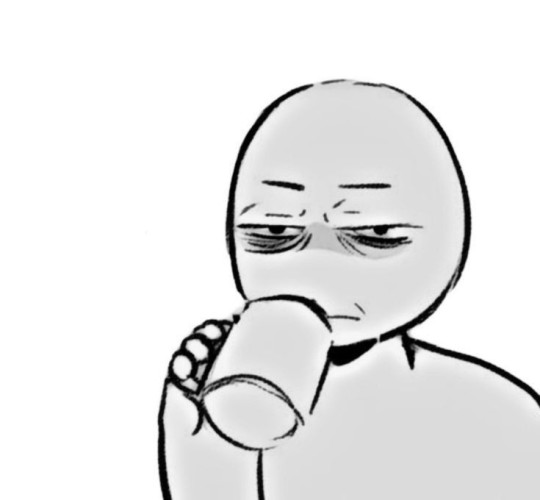
#jojos bizarre adventure#jjba#jotaro kujo#mijin ramblings#I still have that psyche analysis that's coming soon so I guess this post can be somewhat of a little prologue whew#me when I'm old and my tendency to hyperfix is still as strong as ever skssksksk
12 notes
·
View notes
Text
Just the Way You Are
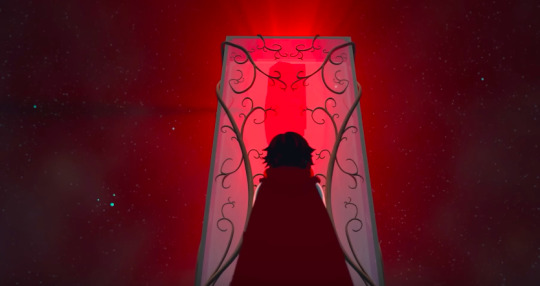
This volume of RWBY isn't one that I've felt like writing a ton about. It's existed as a bit of background noise to my weekends, a must watch but in passing. It was a wonderful journey, but not as impactful as I thought it should be to me. It hit all the right marks. Well-written, well-animated, great music. It wasn't until the finale, where I was reminded, again, of why I loved this show in the first place.
I've been seeing an outpouring of love for V9 that seemed to spur a re-examination of it as a series, in both what RWBY means to fans and what Ruby means to the audience. This whole volume she's been a proxy facing the show's vocally decried imperfections: for what the could have beens and should have beens keep saying. In Ruby's own personal doubt, we see the seeds of the show's very own history of grappling with fan expectations, critical analysis, commercial success, and the complicated legacy of the tragic passing of the show's creator.
But CRWBY's love for this volume is so evident it seemed to drown out any bad faith arguments: this is RWBY as it was always meant to be.

In finishing this volume, I see once more that fiction can help us suture the parts of us that seep. That its creators are people we may never know but whose ideas we stitch into the membranes of our core. RWBY doesn't have to be a masterpiece emerging fully formed from the minds of its writers and animators. It is a vision expanded upon, a messy beginning built up, a work of surfeit love, flawed and lovely in the mess.
As a perfectionist I tend to chase that critical clout, to draw from external sources the meaning of my own art, to wonder if the interpretations are good enough, if the writing and characters are done with enough mastery that I can succeed in other's eyes. But RWBY will never be a success to some, and in that we see that even the most collectively beloved things are criticized by their detractors. We will never create a bulletproof thing.
Life is exposure. Love is vulnerability and art in service to that love - of self, of others, of vision - exacts the same toll of knowing. Even against the diatribes on Youtube that have stated otherwise, RWBY's heart is worn on its sleeve. It is a show fully sure of its sincerity. This volume seems meant to present that to us and to Ruby, as a character. She has always been the heart of the show. Pursuant of hope in the face of insurmountable odds, always picking up the pieces of others, always with the weight of the world on her shoulders. But, at her core, she has always been a simple, more honest soul.
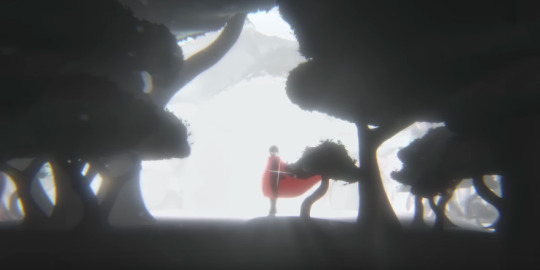
RWBY and Ruby have faced failure after perceived failure. Ruby always tried hard but never quite got it and now, in the sea of her doubt and the under the current of others' expectations, she sees herself as less than. As incapable of serving the people she loves most. Ruby's fear of failure does not come from her need to be beloved, it doesn't come from a selfish interest in public opinion, but rather from a stalwart need to do what she believes in.
RWBY has long been the scruffy underdog of the animation world, an easy little show to poke fun at. This isn't to say that critiquing is inherently bad faith, or that there's no place for it. There is, and there always will be things that irk or bother us to some degree with every piece of media we consume. But, much like the people we love in our lives, those imperfections are part of them, and we can either take them as is and have faith enough that they'll grow just as we do, that their center is good and worth it, or we can simply let them go.
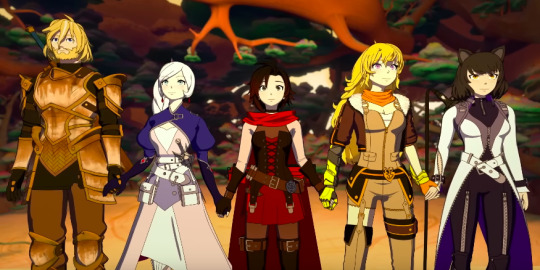
Choose for yourself one who can leave your burdens behind, or chose one who can be enough to bare them.
There's something to be said about the moral simplicity of a show like RWBY, in which things don't always work out, but in which the characters have enough faith in themselves, and the world, to still seek to save it. This is a fairytale, but it is one that hopes to impart on reality a little bit of that kindness.
It is wholly intentional that RWBY is thus stylized as a children's fairytale. It lacks the tonal shift of grit and anger that adulthood seems to impart on innocence, and posits that: no, you don't need to be anything else, even if others decry that self as naive or emotional or exposed. There is a beauty to RWBY's vulnerability and it's always been there, baked into the show itself.
V9 feels like a love letter to RWBY as a whole. It has always been a show set on positivity, on pursing that goodness at all costs. RWBY does not partake in the labor of being something else more gritty or mature or indifferent. It is what it's always been.
A simple, more honest show.
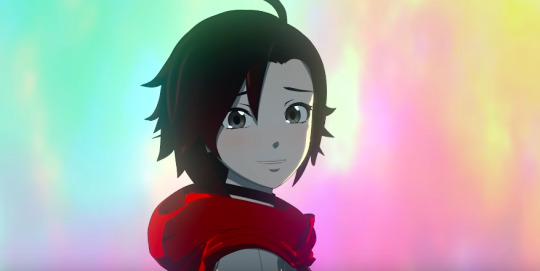
#rwby#this was a long one#im old and clutching my cane but i love this show with a lot of me#ruby to little/somewhat voice: im so glad we got to meet you#rwby v9#ruby rose#is V10 greenlit yet?
86 notes
·
View notes
Text
Guys I need to be a hater for a minute I'm so sorry.
If you have like a deep attachment to the Blue Eye Samurai episode "the tale of the ronin and the bride" look away now cause I'm about to rip into it. Also spoilers ahead for the whole series.
Okay, to preface, I am generally a hater of flashback sequences, so as much as this is a criticism of this episode, it's also a crit of most flashback sequences in film and television. I am also much more willing to let it slide when it's used for comedic purposes like the beginning flashbacks in Psych or clipshow episodes in IASIP or Community. Also, this is all my opinion, you are free to disagree with me all you want and that's totally fine. Apparently I'm the only person who thought this episode kinda sucked so I fully expect to be on my own here. I would like to present my argument nonetheless
Ok disclaimer done, now to get into why I think that the use of flashbacks and framing devices in this episode of BES was a poor choice and pisses me the hell off. Formatted into a numbered list.
It takes the tension out of the main fight. The fight scene in this episode is easily one of the best in the series, but the constant cut aways draws interest away from the fight and seems to equate cliffhangers with tension. On some occasions that would be fine. The bits where they cut to the other characters totally make sense and add to the tension of the fight overall as our minds are still on the fight and the show is not forcing our attention to something that's much less engaging than Mizu fighting like a hundred guys. It also decenters the actually interesting character dynamics we get to see in this episode by putting the focus on the relationship between Mizu and some guy we don't know. There could have been so much more development on the relationship between Mizu and Akemi or Akemi and Ringo which would have been so cool because they don't interact much before this episode, based on the finally, will end up being important relationships later on so why not spend your time showing us that? Why linger on this random guy from the past?
Flashbacks are lame and I don't like them. (This is my list so I get to be petty if I want to.) As previously mentioned, I am generally a hater of flashbacks. I think it's a boring way to relay a character's backstory and motivations to an audience. It often ends up over-explaining things that don't actually need to be explained and take away from the flow of the story. Ofc course, some flashbacks are better than others, for example, I think the flashbacks showing Mizu learning from the Swordfather are more interesting because learning how Mizu learned to fight and where her anger against her father stems from is actually interesting and very relevant to her actions. However, since we did see where Mizu's quest for revenge and fighting ability came from, why do we also need to see her get betrayed by a past lover on screen? Why did we need to see it happen beat for beat in the form of a flashback? Wouldn't it have been more interesting if we got to see her come across her ex in the actual plot of the story and not the metanarrative? Same goes for her mother? Why put the story on hold to tell us this when you could have made it part of the story?
We don't actually need to know every single thing about a character's traumatic backstory, and that's okay. This whole series of flashbacks fell flat for me because I already understand that Mizu is on a quest for revenge, y'all did a great job of conveying that by giving her a one track mind about it. I really don't care about what made her heart cold, isn't being jilted by everyone you've ever met enough to do that to a person? Why does she need a man to drive her to rage? Isn't being a member of an oppressed class enough to do that? She's a woman in an extremely patriarchal society and a member of a racial minority in a racist ass society, that's as good of a motivation as any. The idea that she needs more of a reason to hate the world is frustrating to say the least. In HBomerguy's video "Sherlock is Garbage and Here's Why", he discusses how Steven Moffatt fumbled the character of Sherlock by going back and showing his childhood, as he did with Jackman in Jekyll. In my opinion, if the only way you can think to reveal the character and motivations of a character is via flashbacks, you need to go back to the writing room and think of something else because there are always better ways to do it.
The romance plot is god fucking awful. This is probably my most biased point because I am so picky when it comes to romance plots in non romance stories. I am not against the concept of having romance subplots in non romance stories, and I am actually a romance lover, so it's not bad that there is a romance, this one just sucks dick and balls. Due to the format of it only existing in flashbacks there is absolutely no time for the audience to see the characters have legitimate chemistry or cute moments, so they try to use shorthand like the characters laughing together or whatever, but it falls flat because this is literally the first time we are seeing Mizu's husband and we know almost nothing about him. Every scene with them is super awkward and forced. There's no time for the audience to develop feelings or opinions on him, to the point that I am not using his name because I legit don't know what it is. Again, why not have Mizu come across her ex on her journey and have it be a source of conflict in the story? The way it's currently laid out is so goddamn boring that I was skipping through the parts where they weren't doing shit to get back to the good part (fighting).
Why are men? Must every woman have an on screen romance with a guy? Are we not allowed any other motivation? This isn't just me being a lesbian, this is genuinely such an annoying thing in media. There are so many guys who are on revenge missions who don't need to have their heart broken on screen too explain why they're murderous. Why did this need to happen to Mizu? We couldn't have had fmc with the same insane drive as Anton Chigurh or like the Basterds from Inglourious Basterds? There are basically no women in media who get to be just fucking nuts sans a tragic backstory with a guy and up until this episode, Mizu was one of them. But then we have to see how ooo actually she's a killer because a man broke her heart because god forbid women be angry at their material conditions. I'm not calling the writers misogynists or anything, I just think they took the boring way out in this episode.
The 'mother' reveal. WHYY NOT JUST HAVE THEM REUNITE IN THE BROTHEL OR SOMETHING?!?! This is the most frustrating thing. Her being alive during the flashback only to be killed by the end is a crock of shit if you ask me. It doesn't really affect anything because Mizu doesn't feel any different about her mother before and after the end of the episode BECAUSE IT ALL HAPPENS BEFORE THE STORY! If they had met during the timeline, we could have seen more development of the relationship between Mizu and her mother, but we already know that Mizu misses her mom because that's how she went into the episode. It was already explained in other episodes. Also by the end of the episode, she's still dead so what was the point of the reveal? If she had remained alive, Fowler's reveal that her mother is not her birth mother could actually change their relationship in an interesting way and could create intercharacter conflict which could be fun and cool idk.
The play framing device. I'm not too mad at this, it just feels kind of redundant given that it tells the same story as the flashbacks. I would have preferred they just stuck with this over the inclusion of the flashbacks because it's a lot more visually interesting and less on the nose. I do think that shifting Mizu from being the ronin to being the bride is lame, but that's just because it feels a lil heteronormative to me. Why does she havee to be the girl character in the play? Let her be the man, it's fine actually. I feel like it doesn't give us new information either because we go into it knowing that Mizu is violent and gets called a demon, then by the end Mizu is violent and gets called a demon, so again I think it was a little pointless.
I think that's all of my grievances, so here's some final thoughts. I really liked Blue Eye Samurai overall, I just think that this episode really fumbled the bag. Looking at reviews of the episode, it seems like most other people really liked it and I'm on my own here, but that's fine. I stand by what I said and will proudly hold my status as a hater up high. There are so many more interesting ways the show could have spent its time and I think it's such a shame that it fell back onto such boring storytelling. I also have my gripes with the way that the Swordfather flashbacks played out, but I think that it has a little bit more relevance than the time that Mizu was married so don't think I'm being selective in my hatership. I also have some very specific gripes with the way that this episode affects Mizu's relationship with her gender and sexuality in a really stupid way, but those are largely due to me projecting so I will not get into it here.
Once again, if you really like this episode, that's great, I am so glad. There are some parts I really like. The fight scene is awesome and I really like the parts where we get to see Akemi being the badass that she is. I wish there was more of that. As always, Ringo is the best guy ever and I love him, it's cool to see the way that he stands up for himself when Mizu does something he disagrees with. I just don't understand why we got so sidetracked by something as unimportant as an ex-husband. Usually I understand the concept of show don't tell, but if the only way you can think of to show us that is flashbacks, try again.
Anyway, I hope this makes sense and that you guys get what I'm putting down. Feel free to argue with me if you want, I'd like to understand why people like this episode so much given that I had such a negative reaction to it.
#I am also a butch lesbian Mizu truther but that's MY problem#blue eye samurai#mizu blue eye samurai#the tale of the ronin and the bride
8 notes
·
View notes
Text
The Mosley Review: Netflix’s Avatar: The Last Airbender (Season 1)
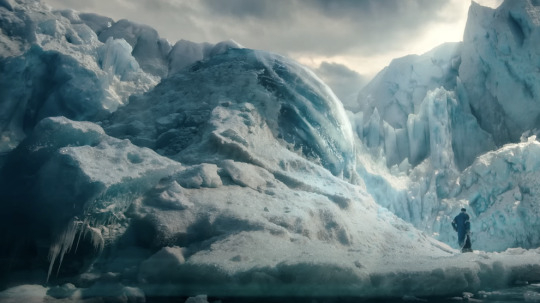
And so the trend to try and adapt a beloved anime, manga or an American animated series to live action continues. It isn't uncommon that the fans demand it or someone has a vision to bring such beautiful piece of art to the big screen. It just the fact that each attempt has been a disaster or has completely missed the point of the source material. Not everything in animation translates to live action so changes have to be made for an audience to digest the information. Which in this case, was a travesty since the rich themes of identity, personal growth, fear, loss and the power of hope is what made the original animated series a masterpiece. Such themes that connected with children and adults alike is what made the series such a massive draw. Now we all know how horrible the 2010 film adaptation so there’s no need to retread those waters. You can say that expectations were tempered going into this new Netflix adaptation with all the problems that existed internally. To be fair, I will not continue this review by comparing every aspect of the original series to this new live action version, but I will always encourage you all to seek out the original series. That being said, I will save my biggest critiques at the end. Now, I went into this series with the single hope that it would be as close as possible to the original series. Well, this was a better adaptation that captured a certain percentage of what made the cartoon special, but you can feel the tug of war going on from the very first 3 episodes. This version wanted to establish that there is a dark and grittier edge to it, but also show the light hearted and fun nature of the adventure across the different nations and the lessons each character learns. In my opinion, for every great moment this series provides and gets right, there was an empty void where any connection to original show or even to the characters themselves was severed.
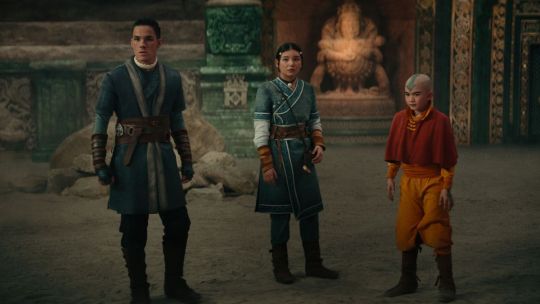
Gordon Cormier was really good as Avatar Aang. In many ways, he nails the character’s many emotional states as he slowly comes to grips with the loss of his Air nomad friends and mentor. He captured the pain in the Aang’s heart and also his childish humor in many scenes. I wish he had more time to actually grow out of his reluctant hero stage instead barreling through the most formative moments with his new friends. Lim Kay Siu was wonderful as Air nomad mentor Gyatso and I loved the emotional bond they had in the beginning of the show. Their chemistry was very strong and was the life blood for Aang. Kiawentiio was good as Katara and I felt she was done dirty in this show. She felt too sheepish at times and I wished she was more strong willed. She had her self doubts which is part of her arc, but I wish her steadfast nature was way more present. Everything was handed to her and she never really earns her upgrades in a selfless way as she comes off as more selfish when with Aang. Aside from a major missing character trait, Ian Ousley was excellent as her older brother Sokka. He nailed the characters' strength and humor, but I do wish he was a little bit more awkward. The family drama between Sokka and Katara was great and I liked the way it was resolved even if it was too quick. The 3 of them together make for a decent group, but I didn't feel as if they were really bonded. It felt as if they were following Aang as extra characters instead of being his friends and actual new emotional core of his heart. Utkarsh Ambudkar was awesome as the King of Omashu / Bumi. His playful nature was on full display and his message about making the hard decision as the Avatar and in his own way, as a King, was heard. He isn't the mad genius you love, but more the war torn and world weary older man. Maria Zhang was great as the leader of the Kyoshi Warriors, Suki. She was strong, had a good and ambitious heart. Her instant chemistry with Sokka was cool and I loved their training montage. I wish they took more time to develop the eventual love story between them instead of just jumping right into it.

Dallas Liu was fantastic as Prince Zuko. He nailed his obsessive desire to capture Aang and bring him back to the Fire Nation. His story was a bit more fleshed out as we get to see the deeper emotional toll of his father's banishment. Dallas also nails the physicality of the character and I enjoyed every action scene. You feel the desperation, pain and overall need to please nature of his broken spirit. Paul Sun-Hyung Lee was great as his guardian and beloved character, Uncle Iroh. He is such a layered character and in the amount of time we get with him, it isn't wasted. I really liked that his past as a warlord was brought up and you see his regret. He is always been the nurturing core for Zuko and he was exactly that for this version of the series. Daniel Dae Kim was perfect as Fire Lord Ozai. He was the tyrannical lord of the Fire Nation that we all know and I loved how cold and unflinching he was in his tactics. There was a moment where I thought we were about to see an emotional side of him come out, but I'm glad I interpreted it wrong. It wasn't a father's care that was being shown to Zuko, it was more disappointment and shame and that was rough. Ken Leung was awesome as Commander Zhao and he nailed the characters arrogance and hunger for respect and power. He wanted forge his legacy in the Fire Nation and I loved his ambition and dedication. He was an excellent adaptation of the villain. On the other hand, we have a character that is not supposed to be focused on so heavily in the first season. Elizabeth Yu was good as Princess Azula, but I believe she missed the point of the character. She is supposed to be the absolute polar opposite of her brother Zuko and truly her "father's daughter". Where Zuko shows doubts and emotion, she shows rage, venom and ice cold dedication to setting the world ablaze. Here she is doubtful, second guessing and sometimes winey as hell. The actress did what she could, but she is the second character in this show that I think was done dirty.

Takeshi Furukawa takes over the reins as the series composer and he did an epic job. He nailed the emotional beats and made the action even more intense. He incorporates some of the original themes from the animated series and a favorite song returns as well. I do miss the touch of Jeremy Zuckerman and Benjamin Wynn, but Takeshi did a wonderful job. Visually, the show was torn between vibrance and darkness and I wish they leaned more into the vibrance of the worlds without the dark overcast in almost every location. Like I said before, there were so many things that rubbed me the wrong way as this adaptation completely rushes past or condenses so many arcs for the sake of time. The first 20 minutes of the show was a mistake in my opinion, because we see the Air Nomads being wiped out instead of hearing about. Sometimes the stories about an event are more heartbreaking than actually seeing it. That 20 minutes could've been condensed to dialogue like the opening of the animated series. Princess Azula and her friends should have never been introduced in this season until the very last shot of the show. That's precious time wasted to build her up instead of forging Team Avatar. Aang needed to connect more with his new friends and rely on them instead of his dead mentor. That's why they never felt like a team or a new found family for Aang. This show really would've benefited from a 10 episode run instead of 8. In the end, it all boils down to the question of “Was this a faithful adaptation to the original animated series?” I would say that its a good cover album that takes too many artistic liberties and misses the many notes that made the first album a masterpiece. Fans like myself will like it better than the 2010 abomination, but will still see the major flaws. I highly recommend going back and watching the masterpiece the original series is, but if you don't, you'll still be entertained by this adaptation. Let me know what you thought of the show or my review in the comment below. Thanks for reading!
#avatar the last airbender#Gordon Cormier#kiawentiio#Ian Ousley#Dallas Liu#paul sun hyung lee#ken leung#Daniel Dae Kim#lim kay siu#utkarsh ambudkar#elizabeth yu#netflix#nickelodeon
0 notes
Note
// 3, 4, 7, 14 :3c

What’s the best thing about the show/series/books/comics/etc. ? What’s the worst thing about the show/series/books/comics/etc. ? What’s the best thing about the canon you are writing ? Are there some characters from the franchise you can’t stand ? ( still accepting )
MARY COSTA. In full candor, I believe Mary to be the most creatively genius, abundantly talented, and inspiringly unique individual that ever graced us humble mortals. I know not who I'd be, nor what, if I hadn't been exposed to her voice via this extraordinary film as a small child and had her spirit alongside mine during my formative years- but especially now. Apart from the star-studded voice cast, I think one of the most special components is the variety of female characters in the primary cast. A production composed of mostly men is dull to me, and so to have Aurora as the main character, next to the three good fairies, dueling the incredible Maleficent is something that's most special. They're all so highly different from one another, but are such strong energies and absolute originals! No woman in this film is shamed for her motives or wants, nor is that pesky metatextual commentary that has run amok so often in films of this century present. The characters are allowed to simply be themselves and breathe.
There isn't anything I'd label as bad about this film. Everything was executed highly effectively, and I wouldn't say anything harmful to the audience exists in this specific production. Maybe how limited Aurora's screentime is would be my least favorite aspect??? That being said, I do understand why they did that from a creative standpoint and I don't think she suffers from it, she's definitely not underdeveloped, and her aura still rings so strongly. But, with that being said, I would definitely had liked more of her, especially since no one outside of the film has ever been able to capture her likeness accurately.
What I find to be the best of my interpretation is my passion for the character and how long she's been with me. Aurora was the first muse I ever wrote, over ten years ago, and I feel like she lives and breathes inside of me. There are components in her that help me understand myself and the blend between the two of us, when I'm examining her for purposes of writing or even just for my own pleasure, is seamless in my opinion. She's one of my favorite characters of all time and the love and care I've put into researching her to ensure I'm capturing her essence entirely and that not even a syllable of my writing goes against the core of who she is has been my life's work in many, many ways.
There isn't anyone I dislike in the original 1959 film, but I don't think there's a single character I like in the live action. Elle Fanning seems like a nice girl but she was horribly miscast, Linda Woolverton never should've been brought on to write, I think Angelina disliked the final script and it showed, we don't even need to talk about how they disrespected the fairies or the mother, Phillip was rendered completely inept, and turning King Stefan from the loving, supporting figure he had been in the original to the monster that was capable of doing what he did to Maleficent is stomach turning. I wish this project could be wiped from existence because it's a stain upon the franchise.
2 notes
·
View notes
Text
5x12 The Diamond of the Day pt 1
Final two episodes! Big finale! Why am I making myself cry in the middle of the afternoon! Both eps in this post.
I do love that they made Arthur a sore loser
Enter treacherous white woman #2. Srsly it was lazy writing when they did it for Mordred, it's worse now with Gwaine.
I do love the actual Round Table war room discussion but a) why isn't Merlin seated at the round table and b) why does Leon have so much goddamn faith in Camelot's walls? Like??? You literally said the same thing last year and yet Camelot *did* fall when Agravaine brought an army through the tunnels!
Poor Aithusa. Kid's had a rough life.
I do love Arthur responding to Merlin presenting him with all his supplies ready - which he prepared without his magic mind you - with suspicion 😂
But then he calls Merlin a coward and it's sad
Katie has such a great voice. That entire thing in the cave from her taunting to her laughter to the spell, it just just beautifully played.
Whole ass battle to prepare for and Arthur is just walking around moping cuz Merlin isn't there
So, Merlin's father-vision telling him he's magic itself and he just needs to believe in himself to get his magic going again, does this mean he *didn't* need to go to the cave to get it back? Cuz it seems like he needed to recharge in the cave itself, his injuries were healed when he woke up. That seems like magic cave stuff to me.
Also that "always have been and always will be" - I'm taking to mean 'always have been' in the sense that since he's 'magic itself' even before he was born, his magic existed in other, intangible forms, like we are all stardust etc. But now that he is, he will always be, aka he will not die.
Arthur waking up with his wife in his arms and Merlin's name on his lips, jumping out of bed to act on dream-info.
Balinor telling Merlin to trust in what will be.... like bitch that is literally not how this ends.
5x13 The Diamond of the day pt 2
You know that gif of the cat knocking everything off the table? That's literally Merlin shooting lightning at everyone from his perch on the ridge.
I have a lot of snarky things to say about Merlin coming out of the cave in full Dragoon gear and riding a horse instead of teleporting like the other witches but I'ma keep that to myself.
Mordred is a bitch and Aithusa has terrible aim. At least Aithusa's loyalty to Morgana makes sense.
Arthur said oh shit I'm magic - oh wait no it's that old man again
He also straight up "No! Bad dragon!"-ed Aithusa
Y'know, for all I've watched this episode and screamed about Arthur's death, I don't think I've ever focused on the exact moment he gets stabbed before.
Mordred catches him from behind and he meets it, no fault there. But as soon as he realizes his assailant is the knight who turned on him and joined Morgana, what does he do? HE LOWERS HIS FUCKING SWORD
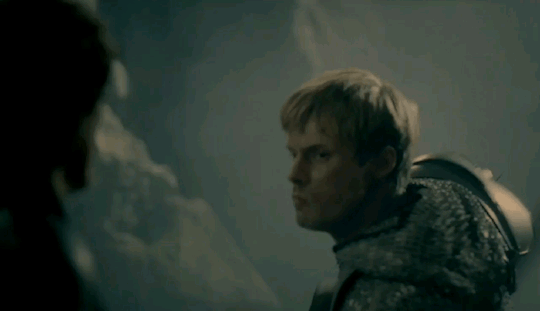
He leaves himself wide fucking open and vulnerable and Mordred seizes the opportunity. I understand wanting the moment of recognition for Arthur, but on what planet is a trained warrior going to drop his sword mid-attack because he recognizes his attacker as a dude who only just recently decided to forsake him? It's soooooo dumb
There was a whole sequence a few episodes back where Mordred and Arthur are sparring, the point of it was to show that Mordred has become a skilled swordsman. So what exactly was the point in having Mordred run Arthur through as soon as Arthur idiotically lets his guard down? This should've been a meticulously choreographed sword fight, with Mordred getting the upper hand and sticking Arthur properly. Not this nonsense. Look at Arthur's FACE! Oh, Mordred... 👉👈 do you maybe wanna be friends again- STAB ... guess not
Uther's been rolling in his grave but he's taking an extra tumble watching Arthur forget all his skills and training in that moment.
I do appreciate Arthur getting Mordred back though. Like that moment of merciless anger followed by the hurt and regret playing on Arthur's face, warring with surety and responsibility. It was good.
I've rewatched the big confession scene about 16 times just now.
I don't quite understand why Merlin took Arthur to the woods to begin with. Instead of bringing him to the med tent in the battlefield or back to Camelot. What was the reason?
Merlin saying it feels strange (to use magic freely in front of Arthur) and him just going 'yeah' completely deadpan makes me laugh every time.
I really feel like Arthur's head should be elevated at a further incline if he's going to be fed.
Gaius refusing to outright expose Merlin as the sorcerer but nonetheless letting Gwen figure it out on her own warms my heart.
My God Arthur is sitting there dying, feeling betrayed about his best friend 'lying' to him, and still he can't stop himself from looking at Merlin's mouth.
Percival summoned MUSCLE POWER
Hey um random but why does Gwaine even know where Merlin and Arthur are headed? Why would Gaius tell him?
Arthur looks at Merlin so lovingly after he's killed Morgana 😭😭
And now he's literally grabbing at the man's hand 😭 "just hold me, please"
That's gotta be the gayest death scene in television history. If you can watch that without thinking Arthur puts his hand on the back of Merlin's head because some part of him wants to bring him down for a kiss, or that "just hold me, please" is in any way shape or form a 'bros' thing, and certainly not at all an intentional mirror/callback to Isolde dying in Tristan's arms, then I'm afraid you are what we professionals refer to as a dumb-as-nails fucknugget, more commonly phrased as 'willfully ignorant'.
"All that you have dreamt of building has come to pass" yeah except for the whole, y'know, magic still being illegal thing.
I've said this before, but, while I'm sure there was a determined intention to have Arthur die in his armor, probably in some kind of attempt to make sure the audience knows he's died a warrior's death, I *really* think it was kinda stupid that Merlin never removed it, despite Arthur being weak, despite the fact that there was something like five days between him getting stabbed and him actually dying, despite that for the duration of that time they were traveling or hiding out. Merlin managed to produce a cloak to put on Arthur, why did he need the full armor on that whole time? Like even if they left the chainmail on, those plates on his shoulder were just getting in the way, and it looked quite uncomfortable.
Also not for nothing but Lancelot got like, every flower in the forest surrounding lush verdant greens in his death boat, Arthur gets a bunch of sticks.
It suddenly occurs to me, watching this now, that the reason Leon/Percival is such a common side pairing in Merthur fics, is because these two motherfuckers are the only original Knights of the Round Table to survive the series. 🤦♀️ I dunno how I failed to notice that before now. My stupidity amazes me.
I'm *really* glad they decided to do this scene with Gwen wearing the Pendragon red dress instead of the black mourning dress. Yes she looks fabulous in it but it's more the symbolism than the 'reality' - with Gwen wearing her house's colors it represents a continuation rather than a finality. Camelot will go on, Gwen will undoubtedly end the war on magic and with Morgana dead (and frankly, I think by now she already brought about the death of all the angry incel type rulers in Albion) there stands to reason her reign will begin with a period of peace, possibly longer than Arthur's. We kind of have to assume that the 'time the poets speak of' is, inevitably, Gwen's reign - which only came about through Arthur's death. It's a little bit toooo subtle in my opinion, but at the same time, I understand the need for the focus on Merlin and Arthur - after all, this show was their journey - not leaving much time to focus on Gwen and Camelot in the aftermath of Arthur's death.
I will just say, the first time I watched this that fucking truck scared the ever living shit out of me. I also just immediately, viscerally hated that scene and declared it invalid - but I think it was because the truck made me jump out of my skin. It has since grown on me, particularly once I started reading 'Arthur Returns' fic.
Everything beyond this point is post-series spec and headcanon, so if that's not your jam you can exit safe in the knowledge that as usual, if there's anything worth commenting on in the S5 extras, I will create a separate post!
For those interested, my go-to post-series fic is We Begin Again by katherynefromphilly I fully headcanon this series as the continuation of the series.
I have a lot of thoughts about Gwen and Merlin post-Camlann.
For one, poor fucking Gwen. She's lost her father, her brother, and her husband, all by what, age 30? That's rough. And who knows what happened to her mom, that was pre-series and I don't think it was ever mentioned.
Merlin, dear god poor Merlin. First of all, I just wanna say straight off that my instinctive headcanon about Merlin was that he never returned to Camelot. I couldn't really say why exactly. I just don't think he could stand being there after Arthur's death. But practically speaking, Merlin's still got Aithusa to deal with, that dragon needs some godsdamned house training asap. He's still the last Dragonlord, it's reasonable to assume he'd immediately take that on considering Aithusa is partially responsible for Arthur's death (the sword Mordred killed Arthur with, only succeeded in killing Arthur because it had been forged in Aithusa's fire-breath) so he's either going to attempt to train the bad behaviors out of Aithusa, or...well...
The only thing is, I do not believe Merlin would abandon Gwen, or Gaius. So my hc is inherently flawed. I do think Merlin probably spend a couple months with his mum, and I do think he ultimately settled near lake Avalon waiting for Arthur's return.
But I do wonder, what must their relationship have been like? Gwen, surely, would've sought his guidance in establishing laws governing the use of magic. And surely, peace cannot last indefinitely, so Merlin absolutely would've defended Camelot and protected Gwen. There's just no way he could've completely turned his back on them, but I doubt he could bear living in Camelot. And Gwen is both strong and practical enough to get on without him there 24/7, even though I'm sure she'd miss him.
I also think she would've found love again. Whether with Leon, as many people hc, or someone else not in the series.
ANYWAY.
Thanks to everyone who came on this journey with me. I will post comments on the extras if I have anything worth saying - and I think I'll do a master post linking all these episode posts after I clean them up once I get time to sit at a computer and do so. Until then! 💙💚
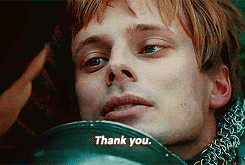
(Gif source) (h/t @shut-up-merlin)
#bbc merlin#bbc merlin spoilers#merlin#merlin spoilers#merthur#onceandfuturerewatch#5x12#5x13#5x12 the diamond of the day pt 1#5x13 the diamond of the day pt 2#bbc merlin 5x12#bbc merlin 5x13#merlin 5x12#merlin 5x13#the diamond of the day#the diamond of the day pt1#the diamond of the day pt2#for the love of Camelot
21 notes
·
View notes
Note
Continuing on the theme of "power isn't everything, nor is it exactly what you think" did stans miss that Derek was actually unhappy during his alpha tenure? And happiness came when he forgave himself, grew, and found new love? When he let go of toxicity? When he actually treated Scott like a brother like he professed in season 1? Power comes from our loved ones, and standing up against oppressive forces. So, why are they stuck on keeping Derek alpha? Just kidding, I know why
In my opinion, there are three primary reasons why certain stans are stuck on keeping Derek as an alpha. One of them is racism, which is the one I think you were referring to; one of them is heteronormativity, which is as easy to parse as it is still prevalent;[ and the final one is the fetishization of suffering, which is a byproduct of Christian thought misapplied to our culture.
None of these arguments are going to win me any friends.

To me, the racism aspect is very clear. While Derek losing the Alpha power had nothing to do with Scott’s actions and everything to do with Derek’s rejecting power for its own sake, his loss narratively paralleled Scott’s ascension, so in the minds of certain members of the fandom, there was implied causation. Theories appeared that Scott ‘stole’ Derek’s power, usually through Deaton’s manipulation of the Nemeton sacrifice (however that worked), even though Scott was already manifesting True Alpha potential in Season 1.
There was no other indication that anyone really consider this a possibility. Derek was supportive of Scott as alpha. He was the first person in the series to actually describe what made Scott special, which wasn’t the use of power, but Scott’s compassion, humility, and resiliency. As for the title of alpha changing hands, Derek himself remarked “It happens” when questioned by Scott on the change of the alpha power from Laura to Peter. (Only Peter had a problem with Scott as alpha, and that was less Scott as alpha than Peter not being alpha.)
Yet parts of the fandom insist that Derek retain his alpha status, even though he failed at it and was miserable while being alpha, even after he became so much happier (and more effective!) without it, is because, as I’ve talked about before, the audience has been trained to see the highest status as rightfully belonging to upper middle-class or upper class white families. Decades have taught them that is who is supposed to be in charge, so the fact that Derek doesn’t have this status and Scott does is unsettling to them. (This is also why you see so many human alpha Stiles stories, when Stiles doesn’t have the leadership ability God gave a dachshund.)
A lot of shipping also requires Derek to remain an alpha. This comes from holdovers of the “best suitor” model of romance and heterosexual love that dominated our culture for centuries. They identify with Stiles, so they believe that Stiles deserves to be won by the best suitor,’ and conversely, Derek deserves to be the the best suitor for Stiles. That’s part of the romance – celebrating the perfect couple, finding the perfect match between the dashing man and the blushing girl he chooses to make his. How can Derek sweep Stiles off his feet and fulfill all his needs if he’s not the best? Think about it - if the goal of the romance is to get the best man, then the female-analog’s goal should be to want the best, the hot-shot, cocky, muscular millionaire race-car driver, not the balding, mumbling accountant who collects seashells. The best, in the werewolf world, is the alpha, so Derek must be the alpha in order to fulfill this ancient and tired role in their fantasies.
Finally, United States culture has been influenced by Christian thought misapplied – in this case, the concept of virtue in misery. It is through the Passion that all humans are saved, it is often by martyrdom that sinners become saints. Christian thought intended this to apply to spiritual status, not secular power. Disabled people fight with this remnant every day when well-meaning people apply this concept to their physical lives. ‘Your suffering must have made you so strong.” No, suffering is suffering.
But this misapplied concept persists, permeating our society. In terms of this fandom, it serves to make Derek the logical choice to be rewarded. Derek had his family killed, endured Paige, was raped by Kate, betrayed by Peter, tried to form a pack only to see it torn apart, and then was manipulated by Jennifer. He’s suffered a lot, but the show insisted that doesn’t make him a good person or even worthy of being an alpha. Nothing underlines the show’s concept more than this scene:
Isaac: Why’d you do this to us, Derek? Was it all about the power? Were you bored? Were you lonely?
Derek: Maybe.
Derek’s loneliness, regret and misery doesn’t justify the actions he took for the writers of the show, but it does for parts of the fandom because of the cultural bias toward the idea that misery ennobles. Derek should be alpha because he suffered the most – his secular power should be a reward for all he has endured. Thus the endless tags of “Derek deserves nice things.”
This runs counter to the theme of the show that trauma is trauma – it doesn’t justify anything. It doesn’t empower anything. The fact that Derek’s anchor is anger over his tragedies is presented as a bad thing. The fact that Scott’s anchor is Allison – a person whom he loves despite all the pain her family causes him – is held up as a good thing. When that anchor goes, Scott’s anchor is replaced by faith in himself, and he finds that by not allowing the significant trauma he’s gone through to embitter him, to dim his optimism, or to shatter his faith in other people. Scott becomes a True Alpha not through embracing his suffering but by overcoming it. When terrible things happen to him (and they do), he gets back up and works to make things better. Derek and Brett literally give speeches about it. Scott, when mentoring Liam on leadership, says the same thing.
By the by, this is one of the reasons anti-Scott stans feel the need to claim that Scott didn’t suffer anything. To them, if Scott doesn’t suffer anything bad, than he can’t be ennobled and thus he’s not deserving. It’s also partly why members of the fandom claim that Derek was a ‘clone’ or mocked him as ‘zen Derek’ when he was no longer a tightly wound ball of misery in Season 3B, 4, and 6. To them, secular power is dependent on the depth of misery, determined by the Trauma Olympics.
15 notes
·
View notes
Text
No one could accuse James Norton of allowing himself to be typecast. The 34-year-old has played a vicar-turned-sleuth in Grantchester, a violent rapist in Happy Valley, and the aristocratic hero of War & Peace. He’s also number three in the betting to be the new James Bond. And he’s just about to add to his library of opposites with two new roles: the staid tutor John Brooke, who marries Emma Watson’s Meg March, in the star-studded new film adaptation of Little Women; and the flamboyant real-life figure at the centre of the Profumo scandal – Stephen Ward – in BBC One’s The Trial of Christine Keeler.
“Ward was 100 per cent the fall guy,” says Norton, sporting a dark-blue crushed velvet jacket and settling in on a chaise longue in an upmarket London hotel. The actor looks every bit as debonair as you’d expect for a man playing the high-society osteopath with connections that ran from Soho to the aristocracy. “The government needed to clear their own name by tarnishing someone else’s.”
It was Ward who introduced the 46-year-old Secretary of State for War John Profumo (Ben Miles) to 19-year-old model and showgirl Christine Keeler (Sophie Cookson) at a party at Lord Astor’s country house estate of Cliveden in 1961. It led to an affair that exposed Profumo as a security threat – thanks to Keeler’s simultaneous relationship with a Russian naval attaché.
Keeler and her friend Mandy Rice-Davies (Ellie Bamber) often stayed at Ward’s London mews flat, and the 50-year-old former public schoolboy would later be prosecuted for living off immoral earnings in a dubious case of establishment revenge. The two had contributed small amounts to household expenses. Ward committed suicide after the judge’s summing up amounted to a direction to the jury to find him guilty.
Amanda Coe’s stylish, evocative drama establishes Keeler and Rice-Davies as sexually liberated young women for their time. Does Norton think they were victims? “Ward definitely used certain relationships he had with young, beautiful women to ingratiate himself with the wealthy elite,” he says. “He also groomed them to a point… but it’s too simplistic to say he was a man who groomed young women. His relationship with these young girls was often a very positive one, he would enable them, take them out of poverty.” Keeler was from a disadvantaged background and fitted the mould of the “alley cats” Ward liked to befriend. Norton gives a terrific performance as the sleazy Pygmalion.
“I really warmed to him… you fall in love with these characters, and Stephen Ward was way ahead of his time, so brave in how he lived his life and expressed himself, his sexual tastes, his flirting with cross-dressing, in a world that was still incredibly repressed.
“And the final reckoning was that Stephen Ward had somehow corrupted these Tory ministers and it was all his fault, which is absurd.”
I wonder if Norton, the son of a retired college lecturer and a mother who taught medical ethics, is as dazzled by the truly posh as Ward was.
“Wealth or class are not things that I’m particularly dazzled by,” he says. “I am by talent.” He cites Little Women director Greta Gerwig and her partner Noah Baumbach, who made Netflix’s Marriage Story, as an example.
Norton himself is part of a powerhouse acting couple, with British star Imogen Poots, whom he became close to when they starred together in a play in 2017. They seem very happy. “It’s good,” he says, but adds, “my personal life is very normal, I have a house in Peckham, my [parents] live in Yorkshire. There's very little glamour and scandal.”
There was a little bit of the latter when his previous girlfriend, actress Jessie Buckley, said their break-up had been “acrimonious”, but Norton is far too canny to add fuel to that particular fire.
Similarly, he won’t comment on the rumours linking him to James Bond, insisting they are “based on nothing”. But that doesn’t mean he doesn’t have strong opinions on the series in general.
“We all know that with James Bond, large parts of it, and all the versions of it in the past, are now antiquated and it needs to be updated,” he says. “And I think that Barbara Broccoli and the producers are very aware of that. Bringing in people like Phoebe Waller-Bridge can only help.”
Might the spy be a little too one-dimensional for someone who has taken on so many interesting parts? Daniel Craig, who is stepping aside after the latest film No Time To Die comes out in April, has often seemed unhappy with the role.
“If I was to take on a franchise,” Norton says, “I would always want to complement it with something completely different.”
He has just taken on a big HBO sci-fi series, The Nevers, he says, and is in negotiations with the BBC about doing a second series of McMafia. We chat about the fact that the first series attracted a measure of criticism, including some for his own performance as Alex Godman, the scion of a Russian mafia family drawn reluctantly into the underworld. “There was an article about the three wooden faces of James Norton,” he says with a laugh.
How did he take it?
“It’s a rite of passage that you have [bad reviews],” he replies. “Ultimately, it’s an art form which is deeply subjective and you’re never going to please everyone.” The character was intended to be “inscrutable and calcified”, he adds. Nevertheless, he admits he might play it slightly differently second time around.
“Yeah, possibly,” he says. “But, then again, you don’t want to pander to the people who didn’t like it. There's so much content out there that people who don't like it can go and find something else.”
One of the factors that Norton and director James Watkins agreed upon when sketching out Godman’s background was his public school education. Norton is a public school boy too; a former pupil of Ampleforth, the leading Catholic boarding school which was found to have covered up the sexual abuse of scores of children in a devastating report in 2018.
Norton never saw any wrongdoing during his time there, but does admit to being “quite badly bullied” and credits one of the monks - a Father Peter - with helping him get through it. “I was able to go and just talk to him and he basically became my therapist,” says Norton. “I just sort of sobbed my eyes out.”
Has it left a mark? “It probably has a bit,” he says. “It’s not defined me, but it has informed who I am. I’m hyper aware if someone is being in any way ostracised on a film set, for example.”
On Little Women, he found himself on set with some of the industry’s biggest names, including Saoirse Ronan, Timothée Chalamet, Meryl Streep and Laura Dern. The film’s a deliriously romantic and sentimental take on the novel’s sibling rivalries, but it takes its duty to Louisa May Alcott’s study of the economic subjection of women seriously. “It's important for us to go back to those punctuation marks in the struggle towards equality and recognise how far we've come, but also how we're not quite there yet,” Norton says.
He and Watson were given the task of writing their own marriage vows for the film, which he says he laboured over but arrived with them unfinished to discover that Watson had already written hers and they were beautiful. He was just young enough to read the early Harry Potter books, he notes, but has only seen a couple of the films – “Don’t tell Emma.”
He plays Chalamet’s tutor – did he fancy the 23-year-old as everyone else seems to right now? He smiles. “He’s a beguiling and bizarre, unique force of nature,” he says. Norton had been wondering about wearing a suit to today’s photoshoot, but is glad he didn’t as he’s just bumped into the younger man in a Gorillaz tee-shirt and sunglasses. “Whenever he’s around, I feel about 10 years older than I am.”
Among all its bold women, I wonder if his own character – John Brooke – is just a teeny bit dull. He laughs. “He’s a little quieter than some of the other characters, but that allowed me to just witness all these great women actors. It was incredible.”
There’s certainly nothing dull or quiet about the character he plays in the film Mr Jones, which is released in February. It’s the surprisingly little-known story of Gareth Jones, the journalist who uncovered the Holodomor – the man-made famine genocide inflicted by the Soviet Union upon Ukraine in 1932-33, which is estimated to have killed up to 7.5 million people. “He blew the whistle on the Soviet Union,” says Norton. “He was the first person to go [to Ukraine], and come back and tell the world.”
In the West, the economic crash of 1929 had led to the Great Depression. “Everyone was looking at the Soviet experiment thinking, ‘Oh, it's working’,” Norton says. “They were getting into bed with Stalin and trade deals were being made. And no one was calling them out. Until this one serious, bespectacled, earnest Welsh journalist got on a train and risked his life to blow the whistle.”
I wonder if those types of films can command a big enough audience to keep getting made? He accepts that independent cinema is in a period of shrinkage, but says, “while the audience for this type of film might not be as big as a Marvel movie, we have to protect those stories because film isn't just about escapism. It's also about education.”
15 notes
·
View notes
Note
Radical Opinion: I suspect Kodaka isn't smart enough to write a Big Bad who isn't trying to lose. While I love Junko and V3 首謀者, the gaps in the armor have become much clearer after 4 iterations of the same killing game with the gift-wrapped clues and sloppiness on the Big Bad's part. Thoughts?
I actually answered an ask within a day or two of receiving it, this is like a new record for me, haha. Going under a read more mostly for sheer length of response, nothing new to see on this blog. I think I also need to hire a script editor like Kodaka desperately needs to do... There are V3 spoilers here as well, be warned.
It’s an intriguing question, though! I would probably wager as well that the reason we’re sticking to the formula for self-defeating masterminds is because it’d be incredibly difficult to write a scenario where the mastermind is actually trying to genuinely win whilst having the survivors eventually out-gambit them in order to forcefully end the game before the mastermind achieves their goals, in a way that doesn’t come across as either: Mastermind is a complete moron who overlooks obvious evidence that chain-starts their downfall, or the survivors get handed Deus Ex Machinas in order to win. I kinda don’t blame Kodaka on this one if I’m honest, haha. I feel dirty saying that...
But yeah, I’d also want to see this changed up in an (inevitable) future DR game. I definitely want less lucky coincidences for evidence reveals for a start. Actually have the survivors work towards finding their evidence and analysing it to find out the mastermind’s identity/goals. You’ve discussed this a lot on your own blog but I gotta agree that the Mother Monokuma thing in V3 is SUPER contrived, haha. Even if the intention was that V3 首謀者 deliberately is leaving evidence around, that was still a stretch. There are like so many ways you could improve that whole thing god. Junko was never bad at deliberately losing, jeez!
Junko and V3 首謀者 are my favourite characters in the whole series regardless though, I think the fact they both try to lose makes them pretty great multi-faceted characters, and I ain’t denying the fact that they’re both EVIL as shit, but I’d actually really be interested in a villain character who is actually just flat-out... monstrous and running killing games purely because they enjoy the spectacle of betrayal/bloodshed, with no deeper philosophy/audience behind it that has them basically allowing themselves to lose. I want a mastermind who is actually out for blood and wants to ensure their game only ends with either one person standing or everyone dead.
This sounds like it’d be a very two-dimensional mastermind but I think there are ways you could make them an interesting character in their own right. For example, you could have them conduct a killing game with a group of people that all knew each other (including the MM) beforehand, with no memory tampering. All of them were extremely close in the past but have grown apart over the years due to a variety of factors (distance, beliefs, increasing dislike of certain people, etc) so most people hadn’t spoken for YEARS before killing game. So then you’d have a lot more relationship dynamics that you don’t really get with the current DR formula. And then you’d actually get a mastermind who actually had a personal bond with the cast, rather than basically being a stranger. And therefore makes the Reveal more shocking and horrific.
I know Junko was a fellow classmate of the DR1s, but memory tampering yo. She was basically a stranger to the survivors during the game itself. She’s absolutely a stranger to the DR2 cast (no thanks to DR3 blowing up the idea she was supposed to have courted every character into her cult...) as well. Monaca interacts with Komaru once before the endgame, Tengan... hates his coworkers and has no close relationship with them obviously. V3 DOES attempt to have the 首謀者 be someone who forms a personal bond with the other survivors the entire game... but I think we both agree that game does a shitty job portraying that aspect, since they’re basically a non-entity until the end, haha. Okay I think what I mostly want is a mastermind who is actually a close friend to the other characters the whole game, to be on a completely different tangent as usual... :B
Back to the actual topic, I really do want to see a DR scenario where the survivors actually have to work together to genuinely out-smart the mastermind at their own game, rather than just stumbling into the final trial forcefed answers as well yeah. Mostly, I want a break from the now standard “rival character concocts a crazy scheme on their lonesome nobody could have predicted designed to end the killing game, but it actually amounts to jack shit and does nothing in the grand scheme of things” formula we get in Chapter 5. Because ironically that shit is now HELLA predictable. This probably ties back into actually wanting this series to be the ensemble story it advertises itself as. Give me the MC and rival, or w/e combo, working together in secret after getting over their differences to fuck shit up for the MM, and have the others gradually get clued into the plan as the trial/chapter goes along. Maybe with some POV switching while we’re at it as they make their realizations? But for longer than 2 minutes, pls.
TL;DR - Basically like we always say/agree about, this series needs to actually start twisting its formula for real, and having a mastermind actually gunning for the win, and survivors actually having to work together and figure out their situation without spoonfeeding would be an excellent change along those lines. I’d absolutely be interested in a more ruthless mastermind who absolutely wants to win their game at all costs. But LMAO it’s Kodaka who I now don’t expect anything new from anymore. New writer for the series whilst he’s on break, pls??
#hey Jess I hope you enjoy reading LENGTHY RAMBLING that only somewhat ties into your actual point haha#replies#dangan ronpa v3#V3 spoilers#jinjojess
11 notes
·
View notes
Photo

Hi, I don't know if you meant much by this beyond remarking that Palpatine is a bastard (wich is completely true) but I have opinions on this matter and they exploded and now I have a very long answer to this that nobody asked for, haha.
Opinions specifically about the consequences that war has in parties that weren't originally involved in it, but were pulled into it by others who have Interests™.
Spoilers ahead
While yes, both sides are controlled by Palpatine and that really sucks, the destabilization and involvement in war of neutral parties by the interests of the parties at war is a very real issue that has happened and happens in real life.
Wikipedia page on proxy wars:
A proxy war is an armed conflict between two states or non-state actors which act on the instigation or on behalf of other parties that are not directly involved in the hostilities. In order for a conflict to be considered a proxy war, there must be a direct, long-term relationship between external actors and the belligerents involved. The aforementioned relationship usually takes the form of funding, military training, arms, or other forms of material assistance which assist a belligerent party in sustaining its war effort.
The article includes examples of proxy wars that you may or may not have realized are such. And those are only few of the many many real life consequences of war that I can only assume aren't as talked about as, say, how this country or that got divided into several ones.
Think, for instance, about the US destabilizing Latin American countries by backing up coups that supported right-leaning capitalist dictatorships during the Cold War. Think of dictators Pinochet in Chile and Videla in Argentina (those weren't the only ones, of course). And TRY to imagine the long-term effects of that. Have a Wikipedia article about it. *
And yes, Palpatine does say what gets done or not in many instances but let's not forget that the entire Republic is aware that there is an army of biologically engineered soldiers that are created and raised specifically for the purpose of going to war and (more often than not) dying in battle (have you read A Brave New World?). And sure, the protagonists treat them with respect but there are other characters that tell us that it wouldn't be seen as terribly rare of others to think of clones as inferiors. And this is basically an army of slaves, since if they somehow become aware of the fucked up system they're in and choose not to serve, they become deserters and traitors. For choosing for themselves what they want to do with their lives. People in the Republic know this and NOBODY CARES except Padme Amidala and some of her political allies.
Clone Wars exposes how a War is messy and The Republic isn't the Good Side™. The Republic does have on its side people with strong principles that are fighting to reduce as much as they can the cost of war and the number of deaths and, in general, trying to do the right thing, it is also a corrupt system with other agents who don't care so much about lives as they care about money or about their own interests. The senate voted to fabricate more clones, knowing this would only scalate war further.
By giving voice in the narrative to clones, their doubts and realizations throughout the series, we can see how fucked up their situation is. And this show does a stellar job of showing one side of the struggle while highlighting details of it that makes us, an audience who probably has already seen the prequels and other Star Wars content, see how this seemingly good association of planets becomes a feared iron-fisted Empire that needs to be brought down by other heroes with a different story.
Conclusion: The Republic wouldn't be the Good Guys™ if someone else was in power (unless the senate was full of Padmes haha. But when has that ever happened). It's a political institution that is fighting a war and in a war there are no winners. And wars are like a black hole that sucks neutral parties that have nothing to do with the war into it. And Clone Wars does a good job of making us side with the Republic by making it the protagonist while telling us how things within it are fucked up, and how things progressed until THE EMPIRE was formed. You know. The Bad Guys™ of the Precuels lol. Because those movies were a lot less politically nuanced. Not that that makes them bad, just different style of storytelling.
TL;DR: Clone Wars makes a very interesting allegory of war and the consequences of it that have happened and continue to happen IRL. And there are no simple solutions or explanations to complex problems. So no, Palpatine isn't The Problem™. He's definitely a big big part of the problem, but he isn't the only thing that's making this happen, as we can see if we pay attention to real life world history. And poor worlds (or countries) getting pulled into a war that doesn't care for them sucks regardless of if there's an agent controlling both sides of the battle (but you could indeed say it makes it feel even more fucked up).
*If this was for an essay or a thesis or whatever I'd look for better references than Wikipedia but this is an impulsive reply online. Though if you want to know more about the United States' interventionism in Latin America, I recommend reading Eduardo Galeano. Specially Open Veins of Latin America.
P.S: Clone Wars did fucking dirty to Steela Guerrera (and to other characters who lack the plot armor that the white boys enjoy) and if I have to make a fanfic or some shit describing how it didn't happen (in my headcanon) I fucking might do it haha.
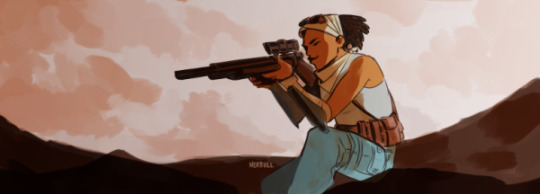
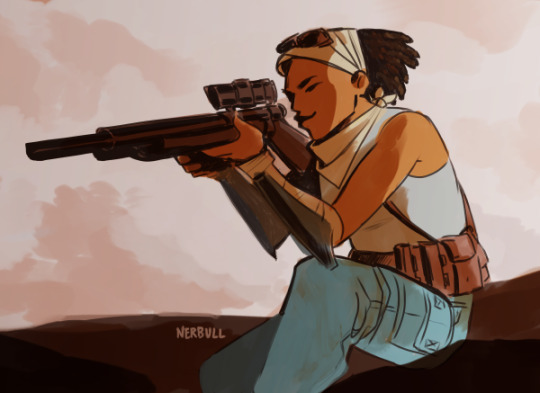
the separatists and the republic destabilizing neutral worlds is too fucking real
#Clone Wars spoilers#Getting political on main#Lol#I don't say shit in this website for so long and when I do it's this...#Hope this all makes sense#English isn't my first language#Clone Wars#star wars
1K notes
·
View notes